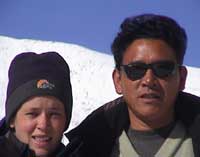The Road to Tibet
The characters
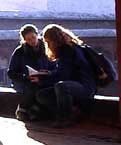 We had met Melanie before the trip. She was recuperating in the Tibet Hotel after a nasty lung infection that had briefly hospitalised her. (The Tibet hotel was probably the worst place imaginable for convalescing). She'd been booked on the previous tour that left on the 21st, but gave up her seat due to her illness. She was looking forward to returning to Thailand after Tibet and Lhasa for heat and sunshine. She hated the cold and worshipped the sun despite being a pale skinned German. She had a riot of ginger hair and an ease of laughter. It took very little to send Melanie off into fits of uncontrollable, infectious giggles. She was one of those people who are great to be around. Her English was impeccable, and she laughed at our impressions of the Germans- Basil Fawlty's "don't mention the war" and our stereotype of them with the beach towels. Her trade was physiotherapy, and she supplemented this with an interest in the esoteric, being trained in reflexology, and palmology, the latter I pooh-poohed as nonsense. I've seen a good confidence trickster convincingly read someone's palm knowing nothing about life lines and mounds of Venus and whatever. Melanie correctly identified me as the eldest child and Lindsey as the youngest. She also got it right when she said Stella was the eldest. Stella had the older siblings ability to organise and take control.
We had met Melanie before the trip. She was recuperating in the Tibet Hotel after a nasty lung infection that had briefly hospitalised her. (The Tibet hotel was probably the worst place imaginable for convalescing). She'd been booked on the previous tour that left on the 21st, but gave up her seat due to her illness. She was looking forward to returning to Thailand after Tibet and Lhasa for heat and sunshine. She hated the cold and worshipped the sun despite being a pale skinned German. She had a riot of ginger hair and an ease of laughter. It took very little to send Melanie off into fits of uncontrollable, infectious giggles. She was one of those people who are great to be around. Her English was impeccable, and she laughed at our impressions of the Germans- Basil Fawlty's "don't mention the war" and our stereotype of them with the beach towels. Her trade was physiotherapy, and she supplemented this with an interest in the esoteric, being trained in reflexology, and palmology, the latter I pooh-poohed as nonsense. I've seen a good confidence trickster convincingly read someone's palm knowing nothing about life lines and mounds of Venus and whatever. Melanie correctly identified me as the eldest child and Lindsey as the youngest. She also got it right when she said Stella was the eldest. Stella had the older siblings ability to organise and take control.
Stella was a Kiwi, from New Zealand and of Malaysian descent. She was a polyglot, speaking fluent Mandarin as well as a host of other languages and dialects. She was petite and was easily mistaken as Chinese. Stella was level headed and kind, laughing easily with us all. She had a frustrating habit of referring to every currency as 'dollars'. It took a while to get used to this, she'd lean over and tell us that the road toll would be 100 dollars and I'd gasp assuming she meant US dollars but what she really meant is Yuan. Indeed I think she said the name of the Chinese currency 'yuan' only once in the time I knew her. She'd taken a few months off work and was travelling around Asia. She'd arranged for her friend, Trevor to join her in Bangkok. They'd then rush through to Zhongdian where they'd take a four wheel drive vehicle to Lhasa.
Stella had invited Trevor to New Zealand several years previously, despite having never met each other. They had a mutual friend who lived with Trevor. Over the phone Stella had organised Trevor's trekking trip for him. They got on well, had a good time and Stella organised another holiday for Trevor. (By the end of the trip to Lhasa, Stella was in the process of organising a trip down the Karakorum highway from Mt Kailash following the old silk route for us all).
 Trevor was in his early forties but looked barely thirty. He had a kind face and his laid back manner made him immediately approachable. We knew within minutes that it would be easy, indeed a pleasure to spend time with Trevor. He was originally from Wales, but spoke without an accent. He'd been married and divorced with two teenage children but spoke little of this. He lived on a canal boat in the West of London and rode a motorbike to work. Talking with him was easy and over the days we talked much about life in London, life on the river and motorbikes (he sowed a seed in my head that later blossomed into an Enfield in India). Trevor had a classic, English wit and made light of most things. He rolled his own cigarettes, occasionally accepting the chemical laden sticks offered to him by the Tibetan and Chinese, but more often he rolled and handed out. His build was slight, yet his appearance was fit and healthy looking although this declined during the trip. He was a strict vegetarian, with signs of fussiness in his eating. By the fifth day, when our diet was stuck in greasy vegetables and rice three times a day, Trevor practically stopped eating, taking boiled water and adding packet soups he'd pull out of a Tescos bag from home.
Trevor was in his early forties but looked barely thirty. He had a kind face and his laid back manner made him immediately approachable. We knew within minutes that it would be easy, indeed a pleasure to spend time with Trevor. He was originally from Wales, but spoke without an accent. He'd been married and divorced with two teenage children but spoke little of this. He lived on a canal boat in the West of London and rode a motorbike to work. Talking with him was easy and over the days we talked much about life in London, life on the river and motorbikes (he sowed a seed in my head that later blossomed into an Enfield in India). Trevor had a classic, English wit and made light of most things. He rolled his own cigarettes, occasionally accepting the chemical laden sticks offered to him by the Tibetan and Chinese, but more often he rolled and handed out. His build was slight, yet his appearance was fit and healthy looking although this declined during the trip. He was a strict vegetarian, with signs of fussiness in his eating. By the fifth day, when our diet was stuck in greasy vegetables and rice three times a day, Trevor practically stopped eating, taking boiled water and adding packet soups he'd pull out of a Tescos bag from home.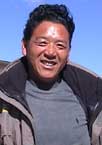
Finally there was our driver. His name was Onedoi, although he also had a Chinese name because to get anywhere in modern China a Han name is essential. It was Yang Jiu. (In the true Chinese fashion, it is read backwards, so Yang is the family name. Similarly the Chinese write their dates backwards; year month then day). It wasn't really his family name. Onedoi was Tibetan. His reason for choosing it was simple. It was his teachers name at school. Onedoi spoke no more than a few words in English, but he spoke Mandarin fluently, so was able to speak with Stella.
Onedoi was forty-seven, married with two children (unlike the Han, Tibetans are allowed more than one child). He had child-like features with droopy eyes and almost a cartoon face. His hair was wavy on top with a large unwrinkled brown forehead. His arms and legs were hairless (my hairy arms were cause for much amusement with him). He was a skilled driver with more than twenty years experience behind the wheel. Many of these were spent driving a truck before he'd saved enough to buy the jeep. He usually drove for private clients, tourists who wanted to see the sites around Zhongdian, occasionally taking foreigners on TTB trips. Like most Chinese and Tibetan drivers, he never held the steering wheel without wearing white gloves. In fact they only came off when he ate, slept and had his tool kit out to repair the unreliable jeep.

The off
And so shortly after midday we set off. Leaving Zohongdian we passed through the plains with muddy arable fields that have recently been tilled, and the landscape dotted with tall wooden frames that look like giant towel rails with barley slung over the rails drying, and turnips. "Do people eat dried turnips?" I ask On doi, "Oh no, they are dried for feeding animals". He doesn't actually say those words, I am relying on what Stella tells me he has said. He doesn't speak English except for 'let's go', 'thank you', 'sorry', 'we happy' and 'WC' for the regular toilet stops.
As we progress across the plains they become flooded, the water level had risen from all the recent rains. And then we begin to climb. We pass through a coniferous forest. The upper reaches show signs of commercial logging with little indication of any replanting. Young shoots of trees are beginning to appear but not in any scale to replace the magnificent forest that has been decimated. Unlike in western forestry, where the chain saws do a neat job, leaving a clean stump, here the sad remains of the trees are evidence of hatchet jobs, the tree stumps sharp and jagged and appearing very sorry for themselves. It is like a battlefield; reminiscent of photographs of the Somme after the pointless trench carnage. But the forest that remains is beautiful, an autumnal riot of colour. Greens and reds and yellows and oranges.
After 45 minutes of sealed road the tarmac comes to an end. We should be lucky for that, One Doi tells us. The road was only completed ten days ago. The smooth tarmac is replaced by a reasonably flat surface that has been prepared for surfacing, but with the recent weather, large potholes have already appeared and we are bounced along as we continue to rise in altitude.
We cut down into a gorge, fast running chocolate coloured water below and steep cliffs either side of us. We stop at Benzalin, a town that straddles the road and get out. Overlooking the town, up in the hills is a Buddhist nunnery. There was a large monastery several kilometres back, but it was suggested we should miss this in favour or the more interesting nunnery.
Claret Nuns
 The nunnery certainly was interesting. Large with white washed walls, two stories high with a central courtyard. We walk around the balustraded balcony that is supported by large wooden columns painted red. There are numerous rooms off the balcony; many with their gaudily painted windows are open revealing dark and mysterious interiors. One has an open fire burning with a kettle hung over the flames. A nun peers out of the dark and smoky room and nervously smiles. There is a lot of smoke. The strong sunlight cuts through it and it feels like we have entered the middle ages. As we walk round the balcony old and young nuns stare at us, flicking the backs of their hands. We wave back. The wrong thing to do; the back of the hand is a welcoming gesture; the palm that we waved means stop or go away! It felt strange walking amidst all these women with shaved heads, and I felt somewhat uncomfortable. With monks I can engage in basic communication and humorous banter using facial expressions and hand movements but here they seemed inappropriate.
The nunnery certainly was interesting. Large with white washed walls, two stories high with a central courtyard. We walk around the balustraded balcony that is supported by large wooden columns painted red. There are numerous rooms off the balcony; many with their gaudily painted windows are open revealing dark and mysterious interiors. One has an open fire burning with a kettle hung over the flames. A nun peers out of the dark and smoky room and nervously smiles. There is a lot of smoke. The strong sunlight cuts through it and it feels like we have entered the middle ages. As we walk round the balcony old and young nuns stare at us, flicking the backs of their hands. We wave back. The wrong thing to do; the back of the hand is a welcoming gesture; the palm that we waved means stop or go away! It felt strange walking amidst all these women with shaved heads, and I felt somewhat uncomfortable. With monks I can engage in basic communication and humorous banter using facial expressions and hand movements but here they seemed inappropriate.
I shall briefly interrupt my monologue with an apology for my English. I'm going to change the tense. The present is getting tedious, and given that I write several days after the trip has ended in Lhasa (yes, we do make it) it seems easier to use the past. I continue...
The nuns smiled. Some were ugly, reminding me of Mick Jagger singing 'toothless bearded hag'. Others were beautiful, delicate faces, bruised rosy cheeks and piercing dark chocolate brown eyes. All dressed in the maroon robes of the Tibetan Buddhists. Some wore yellow hats and all had shaved heads. In the corner a girl who I presume was a new novice was having her head shaved by an elder looking nun whilst three of her young friends looked on and giggled. As she emerged, minus her straight black hair she looked upset. She pulled up her robes over her head to try and cover her now bald scalp, and rubbed it, the old woman had butchered rather than barbered and the scalp looked red and sore. I looked away to save her from further embarrassment. A large matronly looking nun with a delicious smile and rotten teeth rang a bell, calling the nuns to the cavernous assembly room for prayer. Or is it meditation. A couple of dozen or so nuns rushed round the balcony into the hall, kicking off their chunky boots on their way in. Not wanting to pry too much, as they started chanting we left them to it and walked back towards Benzalin.
 On the way down we passed more nuns, returning back to the nunnery with baskets filled with produce. "Hello" they shouted. "Hello" I shouted back. One mouthy nun started jabbering at me in Tibetan with a smile. "If-you-can-talk-quickly-in-your-language-I-can talk-quickly-in-mine" I rapped back at her and she laughed. We walked through a small hamlet, past animal pens with cows gently mooing and chickens and pigs rushing around the paths between the houses. Whilst in Zhongdian the houses had slightly pitched roofs, these roofs were flat, with this idyllic rural scene punctuated by the huge white satellite dishes on the roofs. A couple of photogenic children waved at me so I did the honours and stuck my handycam in their faces. The older ones giggled to see them on the small screen, and the younger one burst in to tears and ran into the arms of his mother. We walked away and the older children followed us. The cheekier of the two started throwing stones at me, running up behind me trying to hit me before I noticed. "Don't give them the attention" said Lindsey.
On the way down we passed more nuns, returning back to the nunnery with baskets filled with produce. "Hello" they shouted. "Hello" I shouted back. One mouthy nun started jabbering at me in Tibetan with a smile. "If-you-can-talk-quickly-in-your-language-I-can talk-quickly-in-mine" I rapped back at her and she laughed. We walked through a small hamlet, past animal pens with cows gently mooing and chickens and pigs rushing around the paths between the houses. Whilst in Zhongdian the houses had slightly pitched roofs, these roofs were flat, with this idyllic rural scene punctuated by the huge white satellite dishes on the roofs. A couple of photogenic children waved at me so I did the honours and stuck my handycam in their faces. The older ones giggled to see them on the small screen, and the younger one burst in to tears and ran into the arms of his mother. We walked away and the older children followed us. The cheekier of the two started throwing stones at me, running up behind me trying to hit me before I noticed. "Don't give them the attention" said Lindsey.
Good advice because they were beginning to annoy me. The stones pelting down on my back were a nuisance and the sunflower head that caught me at the back of my neck was the last straw. "Grrrrr. Stop it" I growled at them. They just laughed. I walked faster leaving Lindsey, who is so good with children, to deal with the naughty ones, by just ignoring them.
The chariot awaits
 Four-wheel drive vehicles usually have names that reflect their rugged aspirations such as 'Land Cruiser' or 'Defender' or 'Discovery' or 'Patrol'. Not so with our vehicle. Clearly the marketing department were not consulted when the Chinese motor company Zhan Qi came up with the moniker BJ5030XXYH.
Four-wheel drive vehicles usually have names that reflect their rugged aspirations such as 'Land Cruiser' or 'Defender' or 'Discovery' or 'Patrol'. Not so with our vehicle. Clearly the marketing department were not consulted when the Chinese motor company Zhan Qi came up with the moniker BJ5030XXYH.
So our chariot for this trip was a Chinese made four wheel drive vehicle which had a typically four wheel drive square design aesthetic, borrowing elements of the jeep and Land Rover.
At the front were bull bars, on the roof a large roof rack with coloured prayer flags tied to the side. Our packs were wrapped up in a large military green canvas bag and a spare wheel tied securely to it. The vehicle (that from now on I shall refer to as a jeep, because Zhan Qi BJ5030XXYH is a bit of a mouthful) left the factory with metallic gold paintwork. This now bore a proud collection of scratches and dents and even larger collection of stickers. These ranged from the English 'Harley Davidson' logo in a tacky eagle, and 'Off Road Jeep Package' (the meaning of which Onedoi was as clueless as us) to Tibetan symbols and multiple 'om mani padme hum' stickers on the bonnet. Prayers stuck on the front, prayers flying from the roof, our safety was always guaranteed!
"Lets' go" grins One Doi. Lindsey and I climb into the back seats, Trevor and Melanie are in the middle and Stella sits in the front next to Onedoi. We maintain these positions for the duration of the trip. It was easier that way, although it is good to vary where you sit. The same place encourages desire and attachment, which cause suffering and thus must be overcome. Or so a monk had told me when I attended a course on Buddhist meditation many years ago. So you should move around and not allow your bum to become attached to one particular place. (Remember how annoyed you felt when someone sat in YOUR seat by the window at the back of the class at school- well I did. Suffering from desire of a plastic chair.)
Tibetan hotel
It was late when we arrived at our first overnight stop. Kawa Karpo appeared to be little more than a two guest house town outside Dequin overlooking the Holy mountain Meli. It was dark so the bit about Meli we had to take on trust. The guesthouse that Onedoi selected for us was full, but despite this the short Tibetan owner found space for us. Lindsey and I were given a small room with a double bed that was accessed by another bedroom occupied by a couple of noisy Chinese men. The others were given mattresses on the partially covered balcony at the front of the guest house. Melanie, who was paranoid of the cold decided this wasn't for her and dragged her mattress into our room. This was to the annoyance of the guesthouse owner who seemed unable to comprehend that it was possible to move a mattress into the room with the double bed and ended up charging Melanie extra for the privilege.
The kitchen was in the dining room and was filthy. Or was it the dining room in the kitchen. Whatever. The room we ate in was dirty and a cloud of smoke lingered. This was a combination of smoke from the wood-burning stove, smoke from the food and smoke from the noxious cigarettes being puffed by the Chinese men at the only other table in the room.
This was the only Tibetan restaurant we would eat in during the whole trip. Onedoi expressed concern for our well being afterwards; Tibetans are not renowned for their cleanliness or hygiene. But more on that later.
After eating we retired to our room. Like so many Tibetan (and to be fair, Chinese) guesthouses and hotels, there was no bathroom for brushing our teeth. This we did outside. Not wholly uncharacteristically there was no toilet either. Ablutions were performed outside behind the most convenient bush. This had the inherent risk in that someone may have found the bush before you. So it was with great care and inspection with the Maglite torch that we found virgin bushes and avoided accidentally treading in something soft and smelly.
Happy snappers and Elvis the monk
Up at an early hour the following morning, Lindsey announces that she is desperate for a pee and rushes out to find a bush. She reappears almost immediately with legs still crossed informing us that there is an army of Chinese photographers outside snapping away at anything that moves, especially big nosed Lawei who squat behind bushes. Indeed there is a posse of them standing in a row, tripods up and cameras pointing at Mount Meli. Or rather where Mount Meli is supposed to be. It was wrapped up in cloud, like a Christmas present, the happy snappers like the excited children full of anticipation round a Christmas tree. Occasionally the cloud would clear, like the dancing girl provocatively revealing her naked flesh, tantalisingly removing her veil before realising it is not such a good idea in front of these ogling men and covering back up just as quick. But for those moments that Meili did reveal herself, the hardware clicked into action. And what hardware. Nikons and Cannons and Leicas. Telephoto zooms, medium format, tripods and monopods and mega pixel handycams with 'professional' written down the sides. Serious stuff that doesn't come cheap. And here they were, Chinese tourists on a photographic holiday shooting away like there was no tomorrow. Click whirr click whirr click Whirrrrrrrrrr as the film comes to an end. Down into the cavernous photographic bag or dive into a flap on the waistcoat with multiple pockets, pull out a roll of ASA100 (professional quality of course) reload and click whirr...
A brisk walk to a bush well away from the posse, then bags on the roof of the jeep. One of the photographers takes a break from shooting Meili through the cloud and attempts a conversation with us in broken English. He is from Hong Kong. "Where are you going?" he asks. "Lhasa" I coolly reply. "Eh?" he exclaims with a desperately incredulous look on his face. He shakes his head and walks away. I had heard someone mention this before, that people in Hong Kong regard the Tibetans as savages. When Stella told her friends in Hong Kong she was going to Tibet they shrieked in horror, 'why would you want to go there?'
In front of the photographers were a number of stupas and prayer flags fluttering in the early morning breeze. Behind them, on the road, entrepreneurial women set up stalls selling prayer flags and juniper branches to throw onto a fire in a purpose built burner. It resembled a circus with all the colour and goings on in this place that was nowhere, save for its abundance of magnificent views of Meili and 12 snow-covered peaks beside it. Magnificent when not shrouded in cloud of course. Beggars tugged at our jackets. A monk walked up to us with his palm outstretched looking for alms. He was in the wrong business. He should have been in Las Vegas at an Elvis look-a-like convention. He wore gold-rimmed Elvis shades, sported long hair (for a monk that is) and had an uncanny resemblance to the King. I suggested he should increase his repertoire of chants from om mani padme hum to include 'blue suede shoes,' and 'in the ghetto' but he didn't seem to understand me. Oh well, his loss.
Back on the road and we gain altitude. The cloud breaks over the Meili range and we catch a glimpse of the Mingyong glacier, the lowest glacier in China. This is the last 'sight' western tourists can see without permits. From here on west we are in 'closed' territory, that has cost us a fortune to enter.
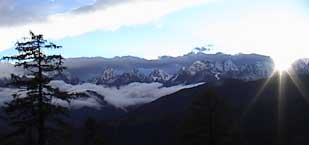
The sounds of Tibet
What music do you listen to on such an epic road trip? What is the sound track to the awesome beauty of the Kham/ Tibet scenery? It is a question I was unable to answer. I loaded Onedoi's multichanger CD player with a collection of discs that we'd picked up in Vietnam. At 50 pence each it was an excellent opportunity to increase my music collection with albums I'd not usually want to fork out thirteen quid on. But none of these disks hit the right note. Maybe that was because all but Queens Greatest hits were recorded too loud for Onedoi's stereo and distorted at even the lowest volume. Onedoi seemed to appreciate the Abba CD, playing a distorted Super Trooper on repeat when we returned to the jeep after one particular stop. It didn't do it for me though. Super trooper is not the sound of Tibet.
The road rises and then descends into a valley, which the Lacang Jiang runs through. This is our old friend the Mekong again. We just can't keep from bumping into one another. She runs a lot faster here than her slow turgid crawl when she was at her Delta in Vietnam. But she is the same muddy milk chocolate brown colour all the way up.
The road clings to the steep slope that is almost vertical to the right of the Mekong. It is little more than a ledge cut into the cliff with a precipitous drop to the swirling river below. The road surface is unsealed, but is in a reasonable condition. I look at my notes that I scribbled in my notebook and see my writing is legible and almost follows the lines on the paper. Later on the trip when the road ceased to warrant the name 'road' my pen strokes quadrupled in size as the hand was jolted up and down, and legibility decreased by a similar magnitude. Despite the relative decency of the road condition we still managed to get ourselves a puncture near a place called Yanjing that is famous for its salt well which once provided salt for much of the Kham area in Tibet. As I looked down to the salt well on the far side of the valley, all I could see was a grimy black expanse of land that looked nothing like salt but Onedoi assured us that this was the place for it.
Hot springs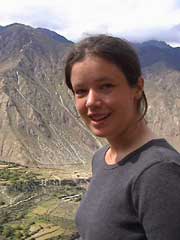
With the wheel with the flat tyre replaced we carried on, after a while taking a left onto a narrow track that cut down to the rivers edge. Hairpin after hairpin with barely inches between the far wheels and the steep slope that the track was cut into. Onedoi drove with great skill and it was here that we first witnessed that he was a good driver. At the river we crossed a suspension bridge that dipped as the jeep trundled across it. We were told to get out and walk across; the weight of the jeep plus five porky westerners was deemed too much weight for the bridge. A kilometre or so on from the bridge was a hot spring. This had been turned into a sort of Chinese tourist spa destination, buried in the valley with yellow-brown cliffs either side. A number of hotel-room style changing rooms were provided for the richer tourists. We plumped for the cheaper bathtubs, which resembled the sort of things you see in sports pavilion changing room as baths, only smaller. I was going to take a dip in the hot pool, but one look at the brackish water convinced me this was not a good option. As I walked away from the large pool I passed a couple of wooden buildings, one of which had a sign in Mandarin and English protruding from its doorframe. It said 'massage'. The door was ajar and I peered in. Gaudy flock wallpaper was stuck to the walls and half a dozen girls sat around playing majong. They were all dolled up with tight fitting clothing and thickly applied makeup; deep red lipstick and painted on eye brows. I'd be hard pushed to call this a sexy look, but they must have thought so, It was obvious this was a brothel. A brothel in the middle of nowhere, but with the posse of all male photographers away from their partners, who were no doubt following behind us business would be brisk for these Chinese tarts later in the day.
Church
 Soaking in the hot bath was a luxury. Clean again. Then back on the road, dust seeping in and all that cleanliness was undone. At Cizong we stopped at what was billed as a Catholic church. Like so much in China, the old structure that was built by a French priest in the early 20th century had been knocked down to make way for a new structure that was in the process of being constructed. On our visit it was just a concrete frame. The completed church will no doubt be in the style of the concrete, bathroom tile cladding and blue glass school that is endemic in China. With little to see except labourers mixing concrete and pushing wheelbarrows, and no sign of the resident priest about, we jumped back into the jeep and continued on west. The landscape became increasingly barren, with yellow and red rock towering above us either side of the gorge. (There's one for you. What is the difference between a gorge a valley and a canyon?) Maybe a gorge is steeper, because in places it became more a valley with buildings hugging the barren gentle slopes that led down to the Mekong. Simple single storied buildings that were whitewashed. The flat roofs were used for drying the recently harvested barley that grew in the fields around them. This region also had electricity. Beside the bales of barley, many of these roofs had large white satellite dishes on them. And on Saturday evenings the residents probably settle round the box to watch the premiership. What a sad thought that many of the Tibetans are inevitably Manchester United fans. Indeed in one remote monastery, I met a monk who could speak no words of English save for 'hello' and 'David Beckham'.
Soaking in the hot bath was a luxury. Clean again. Then back on the road, dust seeping in and all that cleanliness was undone. At Cizong we stopped at what was billed as a Catholic church. Like so much in China, the old structure that was built by a French priest in the early 20th century had been knocked down to make way for a new structure that was in the process of being constructed. On our visit it was just a concrete frame. The completed church will no doubt be in the style of the concrete, bathroom tile cladding and blue glass school that is endemic in China. With little to see except labourers mixing concrete and pushing wheelbarrows, and no sign of the resident priest about, we jumped back into the jeep and continued on west. The landscape became increasingly barren, with yellow and red rock towering above us either side of the gorge. (There's one for you. What is the difference between a gorge a valley and a canyon?) Maybe a gorge is steeper, because in places it became more a valley with buildings hugging the barren gentle slopes that led down to the Mekong. Simple single storied buildings that were whitewashed. The flat roofs were used for drying the recently harvested barley that grew in the fields around them. This region also had electricity. Beside the bales of barley, many of these roofs had large white satellite dishes on them. And on Saturday evenings the residents probably settle round the box to watch the premiership. What a sad thought that many of the Tibetans are inevitably Manchester United fans. Indeed in one remote monastery, I met a monk who could speak no words of English save for 'hello' and 'David Beckham'.
Highway to heaven
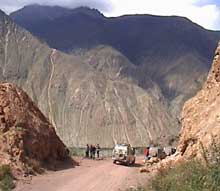 The road gained height. In that sense it deserved the name Highway. Yet the Yunnan-Tibet Highway is no multi-carriageway express route. It is little more than a single lane track chiselled into the mountain. Quite how little like a highway it was, was demonstrated when we arrived at our first unscheduled stop. A landslide. The road was blocked, part of the sand coloured cliff had parted company with its parent mountain and had deposited rocks and gravel over the road. Luckily there were no major boulders and locals had gone some way in clearing it making it passable at a pinch. Well passable at a cost.
The road gained height. In that sense it deserved the name Highway. Yet the Yunnan-Tibet Highway is no multi-carriageway express route. It is little more than a single lane track chiselled into the mountain. Quite how little like a highway it was, was demonstrated when we arrived at our first unscheduled stop. A landslide. The road was blocked, part of the sand coloured cliff had parted company with its parent mountain and had deposited rocks and gravel over the road. Luckily there were no major boulders and locals had gone some way in clearing it making it passable at a pinch. Well passable at a cost.
They imposed a 'tax' for allowing us to drive over the landslide. If we didn't want to pay the tax of 100 yuan we would have to wait for the road to be properly cleared with a bulldozer. And how long would that take?
Montenegran peasant farmer interlude
Occasionally we would pass people by the side of the road, although more often it would be yaks or sheep or goats that would be staring at us. Miles away from any town or sign of habitation a man was sitting cross-legged holding a knife in one hand and a half skinned goat in the other. He was deftly undressing the carcass, stripping it of its skin. But why here, so far from anywhere? Several miles later we passed what looked like the results of his handiwork, the skin of a goat tossed over a bollard by the side of the road, awaiting for its owner to claim it. Further on we pass a couple of local Tibetans hitch hiking. Onedoi waved his hand to apologise and we sped past them leaving them choking on our cloud of dust. I was glad for this. My experience of picking up locals in mountains is limited to Montenegro and resulted in a bizarre experience. One of the Montenegran hitch hikers, a particularly smelly peasant invited us back to his home, and not wanting to sleep in our camper van in the cold autumnal night, his offer was greatly received. He spoke no English, but after treating us to the endurance of several hours of Yugoslavian videos he indicated that sleep beckoned. Great I thought. Rob, who I was with, and I would sleep on the floor in the lounge. Our friend had other ideas and led us into his bedroom. And so Rob and I shared the bed with a montenegran peasent farmer. I made sure I was last to brush my teeth so I slept on the edge of the bed. Rob took the brunt of his stinking snoring breath and windy arse. And so I am dubious about picking up hitch hiking locals on mountain roads.
Melanie's layers
We climbed up passing 3000m. As the temperature dropped Melanie announced, "I've got to put my layers on". She was already wearing what looked like two wardrobes and now she donned yet more clothing. We drove through low lying clouds and then it started to drizzle. As it got colder the drizzle got white and chunky and the hills beside the road got a light dusting of snow. At 3250m we rounded a bend and to our left arched a perfect rainbow. Stop! We pile out of the jeep (sitting in the back Lindsey and I have to wait for Melanie to put on yet another layer before we can scramble out), out come the cameras and the rainbow is committed to film. Imagine the scene, we are all gawping and gaping and 'wow, look at the rainbow' and then I turn round and have to do a double take. The rainbow ceases to be the premier attraction. "Take a look over there" I say. And there they are. For the first time. we see the Himalyalas. Only they are not. They are still the Meli range, but no matter, our first true eyeful of snow peaked mountains. The early evening light enhances their beauty, the setting sun gives them a golden tint that made the moment unforgettable.
From that vantage point over the mountains the road started to descend. The scenery changed from rugged rocky bareness to coniferous forest again. One Doi asks if we want to stop to take photographs in the last of the evening's light. But the temperature has dropped and it is cold, so we just hang out of the jeep windows and point and shoot, taking in the autumnal browns and oranges of the deciduous trees that interrupt the dark greenness of the conifers. Melanie laughs, "that's nothing, it's just like the Germany forests". She adds, "I don't like it like this, it means winter is coming. I prefer the spring!"
The worlds worst
"Are you hungry?" says Onedoi. Yes comes the universal reply. "Ha!" laughs Onedoi, we've still five hours before we stop! He has a good sense of humour has Onedoi. Five minutes later we arrived at Markham.
Markham is the town where the Sichuan highway and Yunnan highway converge. It is thus notorious for its rabid Public Security Bureau (PSB) officers who delight in catching western tourists attempting this route illegally without permits- fining them heavily then slinging them back into mainland China. But this wasn't our concern. Our concern was finding accommodation. It was Chinese holiday week, (October the first is National Day) and all the decent places were full. It was dark when we arrived. Dark both because it was late in the evening and because there was a power cut in town. We would have to wait until the morning before we would see how much of a grotty town Markham was. Onedoi found rooms in a couple of Chinese hotels. Sorry, hotel is far too generous a word to give them. Guesthouse would flatter; hovel I feel is most apt. Trevor and Stella stayed in a room that stunk of shit. Despite their best efforts of blocking the cracks that allowed free progress of the stench from the adjacent latrine it still wafted in. They reported that their beds were supremely uncomfortable; there were no mattresses, only the divans. And to cap it all the owner of the hovel was unbelievably rude, snapping at them when they requested a flask of hot water. Stella, whose family emigrated from China to Malaysia four generations ago was aghast, "I'm glad my ancestors migrated to Malaysia 100 years ago" she said after we compared descriptions of the toilets.
Stella and Trevor would disagree, but I'd like to nominate our hotel as the worlds worst. Our room was a cubicle with laminate walls that didn't reach the ceiling. They were mere partitions, a foot or so shy of the ceiling. A single bed was shoehorned into the room so it touched three walls. A sliver of space less than a metre separated the nearside of the bed and the forth wall. The door jarred when it was slid open. When we entered the room the electricity came back on and we could see the state of our sleeping quarters. The walls were filthy. A thin dried brown substance that appeared to be of human origin was smeared at waist height. We convinced ourselves it was a dried bogey, anything else sent shudders down the spine. There was an incessant chatter from the surly staff down one end of the corridor. At the other end was a grimy sink that had never seen any cleaning agent. A pathetic dribble of water came from the tap. This was the only washing facility in the place. The toilet was outside the main hotel building, just inside the main gate. Two tiny cubicles with a common sewage half-pipe running between them. Wooden planks were balanced over the pipe, which was overflowing. I kicked open the men's toilet and fell back. The smell made me retch. Shit was piled up, mixed with soiled paper and reached the wooden planks. The cubicle was so small, squatting would certainly have meant touching the walls. I could do without my bedtime poo! The ladies was even worse. There was more piss than shit, with flies circling. In addition to the toilet paper were soiled cloths and other lady paraphernalia. A Chinese woman seemed unconcerned, passing me and entering this room of hell to perform her bodily functions. Lindsey and I were not so brave, we went for wee-wees in the courtyard. I had no qualms about pissing on the foundations of this shit-hole.
Prison cells must be better than this. The mattress was lumpy and too thin for both of us to sleep comfortably in. Combined with the high altitude, Markham is at 3500 metres, sleep was difficult. Just as I seemed to enter the land of the ZZZZzzzs I was abruptly woken by the occupants in the cell next to ours. With the wall being only half a wall I could hear everything. It was a loud fart that woke me. I could then hear the Chinese man stretching over his wife who grunted. He then reached to the bedside cabinet for his cigarettes and lighter. He rolled back over her and, lying down, sparked up his first cigarette of the day. In bed. this must be common, for when we have been given the option we have asked for 'no smoking' rooms in China. Such rooms have a sign clearly displayed on the wall. It is an image of a cigarette in a red circle with a red line through it. On closer inspection however, the text below this symbol reads 'no smoking in the bed'. Fifteen minutes later they had vacated their cell. Don't mess around these Chinese. It took us a while longer.
We lifted our packs back onto the jeep and entered a restaurant for breakfast. Breakfast was a large bowl of noodle soup that I found hard to digest at that time in the morning. Besides, my stomach didn't want to be filled any more. My bowels were still in need of evacuation. Oh to find a decent dunny for a dump. Lindsey pointed at a cow, aimlessly wandering down the street. It stopped, and as if to make me jealous, it did a poo there and then. At least he can have a dump where and when he wants I grumbled.
99 bends
 The road from Markham switched back and forth along a stretch that is known as the 99 bends. I'd say this was a conservative number. Despite the bends, the surface improved a little making for a more comfortable ride. The military were responsible for its construction and maintenance, and so we would see young boys with spades in hand, dressed in oversized army fatigues digging holes by the side of the road. Military service is not compulsory in China. Those who I would consider foolish enough to enlist are sent to Tibet for three years training. Much of which involves road construction in freezing temperatures. Those boys of higher rank clearly get the peach jobs of driving the heavy plant machinery. Rollers and diggers driven by the army were the only vehicles Onedoi didn't honk his horn at to overtake. So for long periods progress was slow as we deferentially waited for an opportunity to pass.
The road from Markham switched back and forth along a stretch that is known as the 99 bends. I'd say this was a conservative number. Despite the bends, the surface improved a little making for a more comfortable ride. The military were responsible for its construction and maintenance, and so we would see young boys with spades in hand, dressed in oversized army fatigues digging holes by the side of the road. Military service is not compulsory in China. Those who I would consider foolish enough to enlist are sent to Tibet for three years training. Much of which involves road construction in freezing temperatures. Those boys of higher rank clearly get the peach jobs of driving the heavy plant machinery. Rollers and diggers driven by the army were the only vehicles Onedoi didn't honk his horn at to overtake. So for long periods progress was slow as we deferentially waited for an opportunity to pass.
We drive through small hamlets; large single story white washed buildings. Yaks and goats wander, farmers are in the fields harvesting the barley, drying it on the house roofs. Wheat will grow at this altitude and is yet to be harvested. But it is barley that is the main crop in Tibet; wheat doesn't grow at altitude as was so tragically demonstrated during the Great Leap Forward, a foolish attempt by Mao to collectivise agriculture and grow wheat on the Tibetan plateau. A terrible experiment that disastrously failed resulting in mass starvation. More than one million Tibetans are thought to have perished in that little venture by the so called Great Helmsman.
The scenery changes. We are now amidst arid hills, reminiscent of Afghanistan (I've not been there, but seen enough of it on the telly to see similarities.) Isolated dark green clumps of vegetation dot the landscape like rough stubble on an unshaved face. It reminds me of when, as a child, I made plastic models and set them in realistic settings. I'd take a sheet of cardboard and sprinkle model grass onto glue on cardboard, but I'd never have enough of the grass and it would be patchy with the brown card visible under the uneven dusting. And the painted Airfix tank would sit atop and would look just like the photo on the box and I'd be proud of my model building abilities.
We reach a barren plateau. Scrub vegetation and red and green heather. Somehow yaks and goats are able to find nourishment from this plant life. A nomadic encampment of black yak wool tents is on the far side of the plateau.
We pass the nomads. The weather changes as rapidly as the scenery. In the morning it was bright sunshine. Now, at 4300m it is rainy and misty and we could almost be in Scotland. We drive over a pass to the next plateau, which is desolate. The only sign of life is a majestic eagle soaring above us. As the temperature drops it starts snowing. The road winds up even higher and when it descends into a valley the light dusting of snow by the road side thickens to a crunchy whiteness underfoot. It is only October the forth.
Baby wipes
"Double You See" exclaims Onedoi, pulling over to the side of the road by a derelict building. Pulling over was by force of habit. This road was empty; there were no other vehicles for miles. Why anyone would want to build something at this altitude in this barrenness is a question that can only be answered by the Chinese brains that built it. I know it was Chinese because it was constructed with their building materials, i.e. lots of concrete (surprisingly no bathroom tiles though).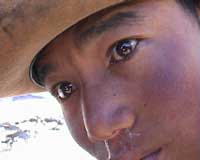
With six or seven rooms there was ample toileting facilities for us all. With my guts bursting with greasy fried food that we had been subsisting on, and three days without a poo I rushed into the furthest room and squatted in glee, despite the icy cold wind blowing up round my bare parts. Snow was piled up around the derelict walls of the building and I deposited a solid present the darker shade of brown in the corner. It was now that I realised I had left the toilet paper in the jeep. I was alone, Lindsey was in the jeep keeping warm, and I wasn't about to shout at my travelling compatriots who I'd only known for three days to bring me, still squatting, some bog roll. So I made do.
Back home we know nothing else but western toilets and toilet paper. Yet it is only a small percentage of the earth's population that use toilet paper. Wiping your arse with something soft, strong and very long is a pleasure reserved for precious few. For many, that tracing paper that scratched your bum and used to be so common would be a luxury. When I lived in Africa, my gardener asked for permission to take the contents of my wastepaper bin. "What for?" I asked him. "Toilet duties" he replied. In the university in Ghana that I worked in, the bin by the toilet was filled with soiled manuscripts and newspaper. (As in many parts of the world the sewage system could barely cope with organic matter- anything manmade was expressly forbidden from going down the pan). In the countryside people would use maize cobs that were considered to have excellent scrubbing qualities.
In the desert nomads will use sand. Afghans will use stones and rocks. Tibetans will use anything that is to hand. Yet there is at least one culture that finds all this wiping abhorrent. The Indians wash their bums. None of this smearing shit with paper. They use the jug of water and left hand which when you think about it is much cleaner than using paper. Especially when you are suffering from the trots and the paper disintegrates in your hand when you wipe your flaming dripping ring anyway. Don't tell me you've not been there too... The French brought us the bidet as an attempt to wash the bum, but when are they ever used for their intended purpose? The point of all this is to explain and excuse my next action. It wasn't that bad. I did the Tibetan thing. I looked around for something to clean myself with. And used what there was a lot of. Snow.
I don't recommend wiping your bum with snow on a regular basis. For a start it is cold and gave me the fear of piles or something else equally nasty that they say you get from sitting on cold surfaces. Here I was getting real close to a cold surface. I packed a ball of snow in my fist and used that. It was icy cold and surprising sharp. But my hands were kept well away from the faecal matter that was being wiped away and with three or four good handfuls the snow that ran the length of my crack was as white as nature intended it. My botty was clean (if cold) and the snow also went someway in ensuring my hands were clean also. Very hygienic, if bloody freezing!
Let's go for a Chinese

From the snowy plateau, surrounded by white peaks we descend back to scrub vegetation, then into grassland and then into forests, all in the space of a couple of hours. The weather changes back from snow to intense sunlight, delicate fluffy clouds and deep blue sky that is accentuated by the high altitude. We stop for lunch at another one street town.
Lunch was the same as breakfast, which was the same as supper would be. Rice and four fried vegetable dishes and one meat dish. Once a week would be great, but three times a day, every day was a bit much. The vegetables always came out leaking grease after swimming in oil on the plate. Meat was usually yak, with a strong flavour it was quite palatable, despite often coming out cold. By the third day it was clear that Melanie was not very good with chopsticks and Lindsey fared little better. So Onedoi would sit between them and top their bowls up with a dedicated pair of chopsticks. His mastery of the chopsticks put us all to shame. But then he has had over forty years of experience with them.
Unlike in Chinese restaurants back home, where x says he will have a sweet and sour chicken with egg fried rice and y says she will have pork with green pepper and boiled rice, eating Chinese in a group is slightly different in China. It is communal eating. Several dishes are chosen that will be palatable to the whole party. Small bowls are provided into which rice is scooped, the diners then take food from the dishes as they like. To make this easier, avoiding stretching across the table (and wiping your arm across the grease that has dribbled from the veg onto the table between the bowl and your mouth ), many restaurants provide tables with a revolving platter in the middle. Green tea is always provided and regularly topped up. It helps cut through the film of grease that lines the upper palate and back of the throat.
All that green tea weakened the bladder so I walked up to the outhouse round the back of the restaurant. The smell made me retch and I brought up a globule of rice and masticated veg. I would pee later....
My apologies. I seem to be going on about toilets too much. Please excuse me, but they are so bad it is hard not to talk about them. Please allow me the liberty to make one more comment about toileting in Tibet and that, I promise, will be the last I utter on the subject. Look, I'll even put it in brackets so you can skip it if you desire. (Tibetan women wear such long and large dresses they can squat at leisure). Hmmm, pointless fact that wasn't really worth all the fuss. I'm digressing from what was one of the more colourful and interesting lunch stops.
Granny's tongue
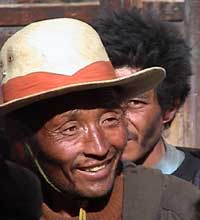 Leaving the restaurant it was as if they had never seen foreign tourists before in Dzogang. Curious faces and blank stares swarmed us. Stella was keen to buy some local clothing; as she bargained at a street stall the crowd grew larger and larger, all eyes transfixed. They don't see many westerners in these parts. I moved back and videoed the whole scene. Attention was then split between the white man with the curious camera and the Kiwi-Malaysian woman buying peasant clothing. A group of girls of school age came towards me. As I turned the camera towards them they ran away as if the camera was a deadly laser gun. One bold girl remained. I turned the camera-viewing screen around and pointed the camera at my face so she could see it. I was on television! Slowly I moved it towards her and focussed on her face. This was too much for her and she ran away. But it had aroused the curiosity of the boys who now grouped round me, jostling to see themselves on the small LCD screen. Anytime the lens pointed towards the girls who crept close, they would run away, shy and frightened of the camera.
Leaving the restaurant it was as if they had never seen foreign tourists before in Dzogang. Curious faces and blank stares swarmed us. Stella was keen to buy some local clothing; as she bargained at a street stall the crowd grew larger and larger, all eyes transfixed. They don't see many westerners in these parts. I moved back and videoed the whole scene. Attention was then split between the white man with the curious camera and the Kiwi-Malaysian woman buying peasant clothing. A group of girls of school age came towards me. As I turned the camera towards them they ran away as if the camera was a deadly laser gun. One bold girl remained. I turned the camera-viewing screen around and pointed the camera at my face so she could see it. I was on television! Slowly I moved it towards her and focussed on her face. This was too much for her and she ran away. But it had aroused the curiosity of the boys who now grouped round me, jostling to see themselves on the small LCD screen. Anytime the lens pointed towards the girls who crept close, they would run away, shy and frightened of the camera.
I performed a couple of magic tricks that dazzled them. I wasn't sure if this was a good idea- would I leave them with a lasting impression of white men as conjurers and black magicians?
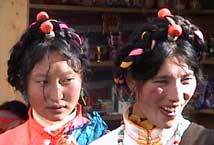
I don't think so; they ran after me copying my movements of making a hankerchief disappear in my clenched fist. 'Again' they cried in Tibetan.
I smiled at an old woman who sat quietly by the side of the road. She stuck her tongue out at me. This repeatedly happened in Tibet and I became used to having old grannies sticking their tongues out at me. Apparently it is something they do when they are shocked or embarrassed!
An older man approached me and took my arm. He rolled up my sleeve and pointed with amazement at my arm. I was used to this by now. Tibetans are hairless. They have not a sprout of hair growth on their arms or legs. So my hairy arms come in for much attention and stoking and pulling. I rolled up my trouser leg for good measure. The girls, who had come close again all ran away. The crowd was growing larger, the circus had come to town and all the residents were eager to take a peek at the freaks. Time to leave, Onedoi had started the jeep, we jumped in and drove out of this strange place with a posse of boys running after us.
Yak butter monks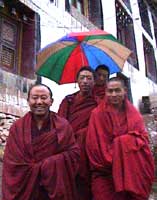
After Dzogang the road steadily climbed and it started to rain. We stopped in the drizzle at the foot of a hill with a steep climb and a monastery perched at the top. We scrambled up with a fierce wind whipping our faces. A solitary monk stood at the doorway and greeted us into the monastery courtyard with a raised hand with his palm facing away from us. It was a dusty expanse that was turning into a muddy quagmire. We walked around the edge of the quadrangle. On the left hand side in a open building a monk and layman were bending iron rods on an anvil with a burning furnace in front of them. We were led into the main assembly hall, a dark, cavernous room with wooden columns breaking the view to the large Buddha in front of us. The stench of yak butter from the butter candles was overpowering. The monk scuttled off and switched on the lights. The hall was barely illuminated by the low wattage bulbs hung high from the ceiling. Around the walls were old, blackened illustrations of the Buddha, Gods, Lamas and religious symbols and stories. In the middle of the hall were long benches covered in burgundy material, which the monks pray on. Their musty dirty robes were neatly folded along them. A few double sided drums and conch shell horns were also on the rows. At the front, under the Buddha figure was a large padded chair with a back and no sides. Steps led up to it as though it was a comfy church pulpit. Our guide, a layman who had taken over from the monk whispered 'Dalai Lama. Shhhhhh.This seat was reserved for Dalai Lamas. It has been vacant for some decades now, since the Chinese invaded Tibet and the fourteenth Dalai Lama went into exile in India.
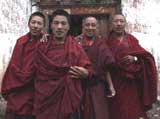 We entered a small room off the courtyard and were joined by a few monks and the layman. The monks spoke no English or Mandarin, but the international language of 'sit down and have a cup of tea' is easy to understand. The difference is, in Tibet, the cup of char is no PG tips, no Typhoo, not even Yorkshire tea. It is yak butter tea. We were each poured a large bowl of the brown milky stuff and a dozen beady eyes watched as we, one by one, brought the bowls to our mouths and slurped in true Tibetan style. Now before I continue, let me describe how they make yak butter tea. Boil some milk and/ or water and pour it into the churn. Take a large slab of rancid butter and pop it in and add a generous pinch of salt. Pump the handle of the churn up and down to beat and froth up the mixture and then pour it into a flask. From flask pour into bowl and watch the westerners faces. I tried. Honestly I tried. You don't know how hard I tried but I couldn't stop myself. My body knows a poison and it did what evolution has taught it to do. I retched. The tea went down and came straight back up again. I swallowed it again and back up into my mouth before one final swallow and it stayed down. A couple more mouthfuls and I stopped bringing up again, but still retched. I smiled graciously, holding back the grimace. And the monks do what monks do when the bowl of tea is beginning to empty. They filled it. Trevor had two good bowlfuls and to his credit he managed to drink the bowl dry. Lindsey managed little more than a mouthful and Melanie fared little better. There was a bowl of sweets on the table and drinking the tea through the sweet made it slightly more bearable for them. Stella was weird and actually liked the stuff! The monks were keen to have news as they are so very isolated on the crest of this hill. Through a process of me speaking English to Stella who spoke Mandarin to the layman who spoke Tibetan to the monks I was able to tell them about the news of representatives of the Dalai Lama talking to the authorities in Beijing and dialogue having started again. One brazen monk asked for a picture of the Dalai Lama in hushed tones. Melanie got her Lonely Planet and cut out the ink drawing of His Holiness and gave it to the monk. As he thanked her he slipped it into the depths of his robes. Having a picture of the Dalai Lama is a criminal offence in Tibet.
We entered a small room off the courtyard and were joined by a few monks and the layman. The monks spoke no English or Mandarin, but the international language of 'sit down and have a cup of tea' is easy to understand. The difference is, in Tibet, the cup of char is no PG tips, no Typhoo, not even Yorkshire tea. It is yak butter tea. We were each poured a large bowl of the brown milky stuff and a dozen beady eyes watched as we, one by one, brought the bowls to our mouths and slurped in true Tibetan style. Now before I continue, let me describe how they make yak butter tea. Boil some milk and/ or water and pour it into the churn. Take a large slab of rancid butter and pop it in and add a generous pinch of salt. Pump the handle of the churn up and down to beat and froth up the mixture and then pour it into a flask. From flask pour into bowl and watch the westerners faces. I tried. Honestly I tried. You don't know how hard I tried but I couldn't stop myself. My body knows a poison and it did what evolution has taught it to do. I retched. The tea went down and came straight back up again. I swallowed it again and back up into my mouth before one final swallow and it stayed down. A couple more mouthfuls and I stopped bringing up again, but still retched. I smiled graciously, holding back the grimace. And the monks do what monks do when the bowl of tea is beginning to empty. They filled it. Trevor had two good bowlfuls and to his credit he managed to drink the bowl dry. Lindsey managed little more than a mouthful and Melanie fared little better. There was a bowl of sweets on the table and drinking the tea through the sweet made it slightly more bearable for them. Stella was weird and actually liked the stuff! The monks were keen to have news as they are so very isolated on the crest of this hill. Through a process of me speaking English to Stella who spoke Mandarin to the layman who spoke Tibetan to the monks I was able to tell them about the news of representatives of the Dalai Lama talking to the authorities in Beijing and dialogue having started again. One brazen monk asked for a picture of the Dalai Lama in hushed tones. Melanie got her Lonely Planet and cut out the ink drawing of His Holiness and gave it to the monk. As he thanked her he slipped it into the depths of his robes. Having a picture of the Dalai Lama is a criminal offence in Tibet.
As we departed the monks posed for photographs in heroic, stoic poses. They laughed with glee to see their photos on the camera screen. As we slipped and slid down the slope they sure footedly ran down after us. They waved as we drove off. Onedoi had discovered Abba and our departing fanfare was Super Trooper. Five times before someone suggested to Onedoi that perhaps he should take 'repeat' off and listen to other Abba tracks as well.
Traffic jam: night on the high pass
It was getting dark, and Banda, our destination for the night was not too far away. We were high, more than 4000 metres and it was cold and wet outside. As we approached the brow of a hill we stopped. There was a queue of lorries in front of us. Traffic jam Tibet style. Unlike traffic jams on the M25, this one didn't clear.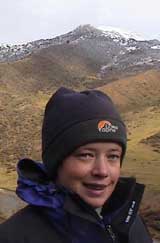
A lorry was firmly stuck in the mud on the road. It was not going anywhere, being firmly dug in. There was little effort being made to move it and everyone seemed resigned to his or her fate. It would not be before the morning that some heavy plant machinery would arrive and move the immobilised vehicle. There was no way around, on the left hand side was a steep bank and on the right, a metre or so from the lorries bogged down right wheel was a precipitous drop to a raging river below. A herd of yaks chomping on the thick grass watched the spectacle. It was eight o-clock in the evening. Hunger: Onedoi was prepared. Or rather his wife had prepared him for this eventuality. She had packed him off with a moon cake. This was from the recent Moon Cake festival, a huge round, stodgy cake in a colourful tin. Beneath the top layer of cake were smaller, individually wrapped mini moon cakes. The cake was heavy and filling, being sweet with a hint of that heavenly sauce you get with aromatic crispy duck in the restaurants back home...
At the front of the jeep, where the rear view mirror should be, Onedoi had a small LCD screen, like you get in the back of plane seats now. He removed my CDs and inserted a VCD into the player and we were treated to Tibetan karaoke. I am not sure if it was this, or the altitude that gave me the headache, but as I unfurled my sleeping bag and desperately tried to get comfortable on the back seat my head pounded.
Sleep was a rare commodity that night. The temperature plummeted. There was hardly any room to move. Lindsey snuggled into my lap. For our joint sanity, it was imperative that she had a reasonable nights sleep. Nothing worse than a grumpy sleep deprived Lindsey in the morning! Finally I seemed to find a position that sleep agreed with and I dozed off. Only to be woken up by the lorry in front of ours a little later. The driver was cold and started his truck and turned the engine over at high revs in order to get the heater cranked up. As with most HGVs in Asia, emission controls were unknown with this engine and it filled the air with choking diesel fumes. In the thin air fumes linger longer and I choked on the noxious pollution as it drifted into our jeep. My headache came back with a vengeance, compounded by the noise and smoke. Sleep is testing at altitude when you are not properly acclimatised. And with these external stimuli it was near impossible. I was glad when the morning came. Thank goodness Lindsey was reasonably refreshed when she woke. Sleep is never enough for her, even at the best of times, but I was relived to find her, unlike me, relatively free of grumpiness. I escaped the narrow confines of the jeep and wandered into the field. The yaks looked on as I squatted and performed my morning toilet duties.
At ten o-clock the lorry was finally freed from its quagmire. We'd been stood still for fourteen hours. An hour later we were in Banda eating Lunch.
Motorhome from Milton Keynes
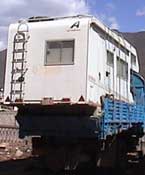 Leaving the restaurant in Banda I saw a truck that looked like it had been specially modified for overland trips. Definitely not Chinese in origin I thought. I wandered over to it. Behind it was a motorhome with a UK tax disc. Over its UK number plate was attached a Chinese plate. My curiosity was aroused. And then I heard a cheery English voice "Hello!" I looked up and a window had been flapped up and open and a white smiling face with a thick beard looked down at me. "Want to look inside?" he said after telling me about his trip. "You bet" I said. There were several of them, members of a motorhome club travelling across Asia.
Leaving the restaurant in Banda I saw a truck that looked like it had been specially modified for overland trips. Definitely not Chinese in origin I thought. I wandered over to it. Behind it was a motorhome with a UK tax disc. Over its UK number plate was attached a Chinese plate. My curiosity was aroused. And then I heard a cheery English voice "Hello!" I looked up and a window had been flapped up and open and a white smiling face with a thick beard looked down at me. "Want to look inside?" he said after telling me about his trip. "You bet" I said. There were several of them, members of a motorhome club travelling across Asia.
They'd come from Europe and been through the Stans and China and were now headed for Lhasa. But the Tibet highway was the worst they'd encountered; one motorhome was strapped to the back of a truck with a broken sump. The road was taking its toll. I was amazed that motorhomes that you usually associate with old people in organised campsites were here. Even more amazed to hear that one was being driven solo by a 63-year-old granny. A couple of middle aged English women who were travelling in another vehicle excitedly came over, "we found them! We've finally found potatoes!" they exclaimed. Melanie wandered over, "we're ready to go." I swapped web addresses with Stephen, this mad motorhomer from Milton Keynes and his motley crew and jumped back into our jeep. We were on the road again.
The Tibetans
 Leaving Banda the sun came out and the landscape took a different hue. The desert scrub glowed and gracefully cutting amongst the black shadows cast by the fluffy clouds was a small black smudge, the shadow of a majestic eagle soaring high above us. Conversation in the jeep ranged from our lives back home to sights we passed to perceptions of Tibet, and the Chinese occupation and history. I asked Onedoi if the Tibetans washed. Rarely came the answer. Often only once a year in preparation for the Tibetan New Year. Then they will soak in hot springs for 7 days and 7 nights. When you are dirty reasoned Onedoi, you have less skin diseases. A layer of yak butter and grime on the skin also lessens the effects of the sun. It doesn't stop many Tibetans from having reddy-black bruised cheeks.
Leaving Banda the sun came out and the landscape took a different hue. The desert scrub glowed and gracefully cutting amongst the black shadows cast by the fluffy clouds was a small black smudge, the shadow of a majestic eagle soaring high above us. Conversation in the jeep ranged from our lives back home to sights we passed to perceptions of Tibet, and the Chinese occupation and history. I asked Onedoi if the Tibetans washed. Rarely came the answer. Often only once a year in preparation for the Tibetan New Year. Then they will soak in hot springs for 7 days and 7 nights. When you are dirty reasoned Onedoi, you have less skin diseases. A layer of yak butter and grime on the skin also lessens the effects of the sun. It doesn't stop many Tibetans from having reddy-black bruised cheeks.
Driving through Chamdo district we neared a place that was undiscovered. How Onedoi knew we were near it if no one knew where it was, was not satisfactorily answered. But this place, he assured us, was an oasis of longevity. The residents of the village live to an average age of 140 with no influence from the outside world. Yeah right, I thought, and the occupying Chinese haven't found it and filled it with bathroom tiled and blue glassed buildings. I don't believe it.
Quagmire
 Sunlight fell on the rough folds of the golden hills. Occasional fluffy clouds lazily floated across the deep blue sky. We start climbing again, crossing the Gamla pass at 4618m as the sun fell lower in the sky. The mountains were at their most photogenic at this time, gold and white and black and required numerous stops for us all to jump out into the cold and point and shoot. Over the pass and the road began its rapid decent. The mountainous slope was steep and 180 hairpin bends had been etched into the landscape. Unlike the Tibetan plateau, this area was still held under the spell of the monsoon rains, and the recent rain that had hit us so hard in Zhongdian and Lijang had obviously been here too. Mud piled between trenches carved by the lorry wheels. It was a quagmire that gave little more traction than on an ice rink. Onedoi engaged the four-wheel drive but we still slid dangerously from side to side along the narrow track. From our high vantage point we could see the road snaking down the mountain. Way off in the distance we could see a line of stationary blue dots. With binoculars we could see the cause of their immobility, an overturned truck at the apex of a hairpin bend. Our hearts sank. Not another night in the jeep. As we approached the hold up the mud grew thicker and progress slowed. Soon we were at the back of the line of lorries. Onedoi got out to investigate. Relief. The overturned truck had blocked the way for HGVs but with careful negotiation smaller vehicles could squeeze between the visible chassis and the exposed drop down the mountain. Onedoi was just about to pull out when a new Toyota Landcruiser cut us up, speeding past oblivious of any risk. "Bastard" said Onedoi. Little did we know that our fate would soon be closely entwined with this bastard.
Sunlight fell on the rough folds of the golden hills. Occasional fluffy clouds lazily floated across the deep blue sky. We start climbing again, crossing the Gamla pass at 4618m as the sun fell lower in the sky. The mountains were at their most photogenic at this time, gold and white and black and required numerous stops for us all to jump out into the cold and point and shoot. Over the pass and the road began its rapid decent. The mountainous slope was steep and 180 hairpin bends had been etched into the landscape. Unlike the Tibetan plateau, this area was still held under the spell of the monsoon rains, and the recent rain that had hit us so hard in Zhongdian and Lijang had obviously been here too. Mud piled between trenches carved by the lorry wheels. It was a quagmire that gave little more traction than on an ice rink. Onedoi engaged the four-wheel drive but we still slid dangerously from side to side along the narrow track. From our high vantage point we could see the road snaking down the mountain. Way off in the distance we could see a line of stationary blue dots. With binoculars we could see the cause of their immobility, an overturned truck at the apex of a hairpin bend. Our hearts sank. Not another night in the jeep. As we approached the hold up the mud grew thicker and progress slowed. Soon we were at the back of the line of lorries. Onedoi got out to investigate. Relief. The overturned truck had blocked the way for HGVs but with careful negotiation smaller vehicles could squeeze between the visible chassis and the exposed drop down the mountain. Onedoi was just about to pull out when a new Toyota Landcruiser cut us up, speeding past oblivious of any risk. "Bastard" said Onedoi. Little did we know that our fate would soon be closely entwined with this bastard.
By now it was dark. Onedoi was having troubles with the four-wheel drive and drove mostly using two wheels. The rear skidded out on the loose, greasy mud. Lindsey and I felt this most at the back and it was with much anxiety and fear we peered out of the window looking down at deadly drops that we would surely slide down if the road conditions didn't improve.
Following our descent the road once again followed the path of a river. It was drier down here but this brought a new hazard, that of dust. We were behind several lorries that were spewing out clouds of fine, sandy dust from their rear wheels. Visibility was down to less than a metre and it is a wonder that Onedoi was able to follow the road. The danger was compounded by the lack of rear lights on a couple of the lorries; it was impossible to judge exactly how close we were to them. If they had braked suddenly we stood every chance of ploughing into the back of them.
The road clung to a ledge above the Nujang River, although it was dark and the river was only visible as a black abyss down on our left hand side. This area is notorious for landslides and Onedoi expressed his concern- in the dark you cannot see the falling boulders. The risk increases at night; the rock expands in the intense sunlight and as it rapidly cools in the clear icy Tibetan night there is greater chance of rocks becoming unstable and detaching themselves from the cliff face. It is not unknown for vehicles to be knocked clean off the road by falling boulders.
An on-coming car flashed its lights at us and we slowed so the two drivers could talk through their opened windows. Onedoi babbled something in a frustrated tone to Stella and performed a three-point turn. There was a landslide ahead and for the second night the road was blocked and impassable. We would have to wait for a digger to move the debris and this wouldn't happen until the following morning. So it was to be another unscheduled stop for us. We prayed not in the jeep. Our prayer was answered, but what we got was not much better.
Road workers cafe
We double backed for about a mile before coming to a long narrow two storied roughly constructed concrete building. The front facade of the ground floor had few windows but plenty of doors. This theme was repeated upstairs with the line of doors accessed by an open balcony. Its exact purpose was never made clear to me, I presume it was the offices and residential quarters for the local road building programme, although there were plenty of people living in tents roughly fabricated from blue white and red striped plastic tarpaulins nearby. (This plastic material is spotted all over China, used for a multitude of purposes, from building material to heavy-duty carrier bags). Onedoi opened a door at the far left of the building, and wanting to get out of the cold, Lindsey followed behind him. She rushed out as quickly as she entered. "What's wrong?" I asked her. "I am not going in there with live chickens clucking about in the dark!" This was obviously the larder. As Lindsey had entered by the front door, a woman had entered by the back and had selected a prime bird. She held it upside down ready for the pot, hence all the clucking. Onedoi realised this was not somewhere we had reason to be in so he tried the next door. It was locked, as was the next. The fourth door opened and we followed him into the building. We walked through a dark and dingy room where a group of Chinese men were huddled slurping noodles and entered another, slightly larger room with a door to the outside and another door to a third room. In true Chinese style they were all open.
There was no electricity; the only light came from a kerosene lamp hung on a door frame. Three men sat round a square Formica table on stackable red plastic chairs. Onedoi and Melanie sat at this table whilst the rest of us sat on a low wooden bench that was against the back wall under a barred window. It felt like a miniature prison cell canteen.
The party bastards
The man closest to me was in his late thirties and looked like he wasn't short of a yuan or two. He had a well fed, yet slightly pockmarked face that was shaded by a baseball cap that had no logo, but fitted his bonce expensively unlike the usual ill-fitted peaked cap you usually see. On his wrist was a chunky multi-featured watch that in addition to telling him the time informed him of the barometric pressure, altitude and compass direction it was pointed. Under his puffa jacket he wore a waistcoat with dozens of pockets and "Cannon EOS" embroidered onto the shoulder. I later found out that he was the driver. A nondescript man sat to his side, the secretary, whilst opposite me sat the man who didn't have to make any effort to prove he was their boss.
I'd recently seen too many Hong Kong movies on busses and I instantly decided this was the Mafia honcho. He had a large fat droopy face with sagging bags under his menacing eyes. A caricature of him could only portray him as a cartoon villain. His attire was smart, with a dapper suit over a woollen jumper.
Food was brought to their table. They started by communally eating meat from a plastic bag that the non-descript man had retrieved from the car. They dipped the meat into the generous glasses of alcohol they'd poured themselves from a five litre plastic container. "Whiskey soup" said Onedoi who had been invited to join their feast. (We would eat later he assured us). We were offered chop sticks to pick at the meat, and only Melanie and I accepted. Trevor is a strict vegetarian, Stella is Muslim and will not eat meat if she fears it may be pork, and Lindsey is a combination of supremely fussy and paranoid at getting sick from eating flesh. The meat was very lean and had a strong gamey flavour. I thought it was yak meat. I walked out to stare at the sky with Lindsey; the night time darkness was awash with stars, flickering in the cold black sky. There was no moon to interfere with this stellar light show. We pretended to knowledgably pick out constellations, but neither of us knows anything other than the Plough. It got cold and we went back to the room. Melanie told me that the yak meat was in fact donkey meat. I am not so sure, but it sounds like a good blag to have eaten eyeore.
As a final dish to the meal, a large basin was carried to the table. Sitting in thin soup was a chicken. Not a nicely diced or jointed bird, rather a whole cock, probably the one Lindsey had earlier seen clucking so frantically, head beak, feet and all. The unplucked neck hung limply over the side of the basin and one of the birds tiny black eyes pointed towards me. It even had the red punky main on its head. I didn't fancy any of it. Melanie did, but quickly reported it was tough and chewy. The three men and Onedoi thought it was tasty though, prodding and pulling at it, sucking meat off the bones and spitting bone and debris onto the floor. And when it was over the waiter who had brought it to the table removed the emptied basin that now contained the slops of soup and remaining carcass, in the same fashion he had brought it to the table. Slowly, with a bent pipe holding a lit cigarette with ash delicately hanging from it resting at the corner of his mouth. Some waiter.
With the bird gone I began to feel pangs of hunger. Unusually for Chinese diners, the group relaxed around the table and showed no signs of the customary sharp exit after eating. It must have been the liquor that was being consumed in no half measures. With more time sitting, waiting, I studied the room further. A cockroach scuttled across the floor. The walls were whitewashed yet grimy. In the corner by my side, three flasks of hot water sat. Behind them was a maze of cobwebs reaching up the walls from the floors. A centipede hurried up the wall, avoiding the cobwebs. Another, unidentifiable insect wriggled, trapped in the spiders web. The spider was nowhere to be seen. Suddenly the room filled with people, a public bus was caught in the jam and its passengers filtered into the building. Faces peer into our room before returning to the front room they'd entered through. The noise level sharply rises. The Chinese are unable to speak quietly. A mandarin speaker finds it virtually impossible to whisper in her native language. Mandarin requires full use of the mouth to convey the different tones, and this inevitably leads to what we in the west would consider shouting. I am told it is even worse with the Cantonese, but not having been to Canton or Hong Kong I cannot vouch for this. A few characters linger by the far wall watching us. There's a handsome dude wearing a cowboy hat (cowboy hats are inexplicably popular in Tibet). He's got a pointed nose and square chin. He wears a long expensive woollen coat with wide lapels and is coolly smoking a cigarette. But his footwear seriously compromises his look. He wears a pair of hideous slip-on shoes and that fashion faux pas of white socks (dirty ones at that) peer over the leather uppers. A monk appears with inquisitive eyes and an innocent smile.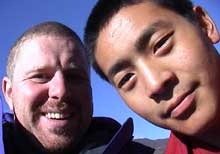
In direct contrast to a shifty looking character with tight curls, furrowed brow that looks every bit like what you'd expect an undercover policeman to look like in Tibet.
Finally we got to eat. But not with the drinkers in that dark cell, rather we were ushered outside onto the 'patio' at the back. I use the term patio lightly, it was a strip of concrete that had eroded and its jagged edge gave way to a long drop to the black abyss of the invisible but audible river below. On the patio were a couple of large cable drums that were on their sides and being used as tables with more red plastic chairs around them. The air temperature is not too low; we've descended considerably in altitude and are in a gorge. It is the wind that sends a chill though the air. And it is the wind that makes seeing what we've been served difficult, repeatedly blowing out the flickering candle, our only source of light out here.
Our meal is much the same as every other meal, grease and rice. Onedoi and his new found friends move out of their room and Onedoi comes to joins us. Those men, mafia man, nondescript man and wealthy man were in the car that cut us up earlier. They were the ones Onedoi insulted as 'bastards'. They were not from the underworld as I had imagined; they may have been crooks but they were legitimate crooks. They were fully paid up members of the Communist Party. The man with the droopy eyes was indeed the head honcho; he was the head of department of the local government in a region in Yunnan. He was on a fact-finding mission to Tibet (read government sanctioned and paid holiday). They had noted Onedoi's driving and praised him as a skilled driver. In contrast to the man with the baseball cap whose lack of driving skills was made up for by the fact that he didn't give a damn about his vehicle. It was a government car (sorry, a peoples car) and it mattered little to him if he fucked it up. Melanie christened these men the Party Bastards.
The softest concrete
Our room for the night was just off the party bastards dining room. It was ten feet square with a solitary filthy glass pane for a window with iron bars across it. On the window cill was the sole source of light, a flickering candle. The room was cleared out and we were to sleep on the floor. Stella unfurled her sleeping bag then cursed politely. She'd not noticed the patch of thick grease in the far corner and her clean bag picked it up. This was no Hilton I can assure you. Trevor climbed into his sleeping bag and announced with his dry English wit that the concrete was the softest concrete he'd ever come across. Lindsey and I went out to find the toilet. Of course there was none, so we went by the side of the road, avoiding the evidence of those who had gone before us.
As the candle started to burn out, the light flickered strongly. Trevor rolled up his jacket and after inspecting all corners of the room to ensure no cockroaches were around, he blocked the crack between the door and the floor. 'We'd have no cockies inspecting the insides of our ears' he assured us. Stella had some sleeping pills, proper granny ones, available only on prescription that a friendly pharmacist had given her in New Zealand.
This was going to be a long night and Stella's offer of a pill was generously accepted. Lindsey wanted some as well, so I bit the pill in half and handed her half a vile tasting crumbly pill to swallow. It felt like we were in a nightclub. Only it wasn't, it was the floor of a dingy cell in a road workers cafe in Tibet.
It was dirty and when the candle burned out it was dark. But by then we were already deep in a drug induced sleep.
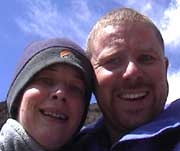 Morning and we were briskly told to vacate our luxury room. With stiff backs we arose, tables and chairs replaced our supine bodies and the room once again became a roadside cafe. Breakfast was noodles. No more noodles for breakfast we told Onedoi and found the mooncake, polishing it off before he could say otherwise. In the light I saw the place was a maze of rooms. In one not too far from where we slept, a scruffy road worker emerged with a handful of dynamite. There seemed to no safety in its storage and carriage. And we'd slept only feet away from the stuff. Stella had disappeared,and when she returned she was distraught. "I went looking for the toilet and I bumped into a man doing a poo right in front of me. I'm going to have to wash my eyes out now!" she joked.
Morning and we were briskly told to vacate our luxury room. With stiff backs we arose, tables and chairs replaced our supine bodies and the room once again became a roadside cafe. Breakfast was noodles. No more noodles for breakfast we told Onedoi and found the mooncake, polishing it off before he could say otherwise. In the light I saw the place was a maze of rooms. In one not too far from where we slept, a scruffy road worker emerged with a handful of dynamite. There seemed to no safety in its storage and carriage. And we'd slept only feet away from the stuff. Stella had disappeared,and when she returned she was distraught. "I went looking for the toilet and I bumped into a man doing a poo right in front of me. I'm going to have to wash my eyes out now!" she joked.
We reassembled ourselves in the jeep and Onedoi turned the engine over but it would not start. He grumbled and climbed out sticking his head under the bodywork at the back of the vehicle. He cursed. During the night someone had cut the fuel line and stolen the contents of our petrol tank. Luckily he had some gaffa tape and a spare can. We were in no hurry; news was the road would remain blocked for some time.
Moving rock
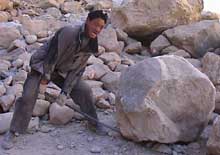 We drive for several kilometres before arriving at the roadblock. It was a heavy landslide that deposited numerous large, heavy boulders and much gravel over the road. It was impassable. Several men were trying to shift the rocks using their hands, shovels and crowbars, but it was futile. Onedoi was soon in the thick of it, coordinating attempts to shift one particularly large boulder. Trevor and myself joined in but it was hard work and we were supposed to be on holiday. We rejoined the girls who watched by. Lindsey barked at me "and I don't want you going back on that landslide. It's too dangerous". And she was right. Streams of pebbles continued to stream down the cliff face and it was likely that too much movement at the bottom of the landslide would set off further movement. By noon a digger had arrived and made swift
We drive for several kilometres before arriving at the roadblock. It was a heavy landslide that deposited numerous large, heavy boulders and much gravel over the road. It was impassable. Several men were trying to shift the rocks using their hands, shovels and crowbars, but it was futile. Onedoi was soon in the thick of it, coordinating attempts to shift one particularly large boulder. Trevor and myself joined in but it was hard work and we were supposed to be on holiday. We rejoined the girls who watched by. Lindsey barked at me "and I don't want you going back on that landslide. It's too dangerous". And she was right. Streams of pebbles continued to stream down the cliff face and it was likely that too much movement at the bottom of the landslide would set off further movement. By noon a digger had arrived and made swift 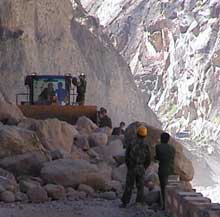 work of clearing the rubble. We hung around the jeep and became, as always, the centre of attention to curious bystanders. The sun had climbed and belatedly risen above the towering lip of the gorge, filling it with a sweat inducing heat. Below the road that was cut into the cliff, the Nujang River angrily gushed, it's water white and frothy and menacing. By 12:30 we were off again.
work of clearing the rubble. We hung around the jeep and became, as always, the centre of attention to curious bystanders. The sun had climbed and belatedly risen above the towering lip of the gorge, filling it with a sweat inducing heat. Below the road that was cut into the cliff, the Nujang River angrily gushed, it's water white and frothy and menacing. By 12:30 we were off again.
The landscape turned dry and dusty with a yellow ochre and reminded me of Ladakh in Northern India. Flat roofed mud brick houses dotted the landscape. The road surface was good and had been recently constructed, but the defences against landslides and erosion were half hearted and we passed evidence of numerous landslides that tumbled down the barren jagged cliff by the side of the road, over the tarmac and down the gully to the water below.
When the finished road surface came to an end, the road construction commenced. Or rather road destruction. The Chinese approach to road building seems to be take the original road, dig it up and fuck it up and leave drivers to make their own way though it. Regularly we would come to large mounds of earth that were tipped across the road making it impassable. We had to double back and go off-road, following the rough tracks that were made before us across the sandy, rocky surface. The Chinese have got their priorities wrong it seems when constructing roads. The first thing they complete are the castellations along the side of the road. In the annals of Chinese road building history they must have been intended to act as barriers on dangerous stretches and tight bends. But now they are everywhere, on straights and gentle curves where they are a superfluous gimmick that no doubt look nice to the engineers that are responsible for their construction. These concrete bricks are painted with diagonal lines of reds and whites and yellow.
Never mind that the road they guard is unsurfaced. Never mind that it consists of two deep furrowed tracks dug by lorry wheels. Never mind that it is more often than not impassable and we drive the other side of the barriers on land they are supposed to protect us from driving on.
It takes great skill to have such risible roads in your country. A skill the Chinese have mastered. On one stretch it took us two hours to go thirty kilometres. The scenery was fantastic though, barren with red and yellow granite rocks (sad that every time I see granite I think of posh kitchens back home) and colourful heathers, following a dried up river bed with mountains either side of the eide valley.
We get the munchies. Lindsey announces that she wants fish and chips. Bad move thinking about food from home. But we've got some biscuits and get stuck into them. The marketing on the packets is pure Chinglish.
Lottee Choco Bouché [chocolate cakes] "Confidence of creating deliciousness. This tastiness cannot be even carried by both hands"
Heavy Discount [biscuits] "If disapproval we will drawback."
Luckily we didn't disapprove so will never know what their drawback would be.
We are bounced up and down. Lindsey and I feel it worst in the back. It is clear that there is no co-ordination with the road-building programme, navies are just told to go on and dig holes and one day a surface may be laid. It gets to the point where if we find two routes ahead, a shit bit or a good bit, we will always take the shit bit, as inevitably the good bit will be blocked by some purposely left hole or mound of ballast. It is dusty and Trevor complains that he has swallowed half of Tibet. It will take years to complete this road. Women and children are the main workers in the construction effort; I saw one woman doubled over, digging earth and depositing it in a bag with her tiny baby strapped to her back. Several men sat nearby just looking over her.
Blocked again
It was almost six o' clock and Rawok Tso was close. For the first time in a while we would arrive at our intended destination at a reasonable hour. Or so we thought. Three kilometres before Rawok we found ourselves behind another queue of blue lorries. Onedoi went to the front to find out what was up. He came back with sobering news. Another landslide. And it won't be cleared before the morning. As Onedoi was telling us this the Party Bastards in their flash Landcruiser pulled up alongside us. Along with another vehicle, the three of us would turn round and take a slip road they'd spotted some way back. None of them had ever taken this road before, but they reckoned it would be an easy twenty-kilometer detour to Rawok.
It was as we followed the Party Bastards through a field that things went wrong. The driver with the fitted baseball cap just ploughed straight on rather than avoiding the muddy quagmire as Onedoi had done and found himself firmly stuck in the mud. It is a mystery that the same people who built the Great Wall of China are responsible for roads like these. With four wheels spinning and no moment he was not getting out without help. Meanwhile Onedoi, who had been having problems with engaging the four-wheel drive jumped out, removed his tool kit and went to work. It was dark and cold, but the field became a garage. The front nearside wheel was off and the drive shaft was being removed. The Party Bastards would have to wait. It was their face that had been lost. The repairs to the vehicle were taking longer than expected and the hours ticked by. By midnight I'd resigned my fate to another night in the jeep. Stella handed out more sleeping pills before collapsing in her sleep, slurring her last words and dropping into a deep slumber. Once again, Lindsey and I shared a pill, unfurled our sleeping bags and tried to get comfortable. There was some urgency to this, sleep was only minutes away and we desperately sought that Position of Comfort. We climbed over each other, shuffled alongside each other, head to toe, then on top, then side by side, with moans and complaints from each of us. Melanie and Trevor were in fits of laughter. "Yar" said Melanie, "It looks like you two are practicing the Karma Sutra!"
I remember Onedoi getting back into the car, sullen faced. The front drive shaft was broken. We no longer had four-wheel drive; we were down to two wheels. And I remember the Party Bastards being towed out of the mud; looking at my watch (it was 1am) and then bouncing on the road as we slowly moved on. The pills proved their worth, according to Trevor this stretch was the worst yet, and scared the hell out of him. I didn't want to know anymore. By three o-clock I was shaken out of my sleep, still in a daze. We'd arrived in Rawok. A slow somnambulism to a hotel room and I was out cold again.
Alpine beauty
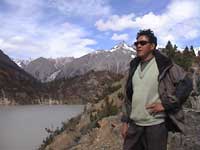 Just outside Rawok is the lake, Rawok Tso, a magical expanse of water surrounded by alpine scenery and snow capped peaks. Melanie, Onedoi and myself scrabbled up a hill to take photographs and enjoy the breathtaking views. I taught Onedoi some English that was appropriate for the occasion, I pointed at myself, at him, and all of us, then he learnt a mantra he would often spontaneously burst into "Eye, you, we....happeeeee."
Just outside Rawok is the lake, Rawok Tso, a magical expanse of water surrounded by alpine scenery and snow capped peaks. Melanie, Onedoi and myself scrabbled up a hill to take photographs and enjoy the breathtaking views. I taught Onedoi some English that was appropriate for the occasion, I pointed at myself, at him, and all of us, then he learnt a mantra he would often spontaneously burst into "Eye, you, we....happeeeee."
The road from Rawok ascended to the Game La pass at 4618 metres, passing towering multi-coloured granite rocks of white and yellow and black and red with forests dazzling in their autumnal beauty washed with yellow and green foliage. And below, as so often on this trip, we followed a river thundering through the valley. This stretch of the road was reasonably good again. But it was old meaning that construction/ destruction has yet to begin.
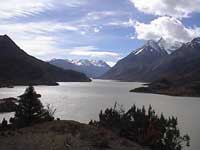 After the pass the road winds down and it being maintained by a different company to the one that had knackered the previous days stretch. The workers wore yellow hard hats and seemed to know something about road construction. As is so common in China, slogans were painted on banners and walls by the side of the road. As we slowed passed one I asked Stella to translate it for me. "Lack of oxygen, not lack of strength".
After the pass the road winds down and it being maintained by a different company to the one that had knackered the previous days stretch. The workers wore yellow hard hats and seemed to know something about road construction. As is so common in China, slogans were painted on banners and walls by the side of the road. As we slowed passed one I asked Stella to translate it for me. "Lack of oxygen, not lack of strength".
Further on we passed a group of three Tibetans on their way to Lhasa. After every three steps they would prostrate. At that rate this pilgrimage was going to take them a long time. Lhasa was still some 1300KM away. Still, our pilgrimage was not moving much faster.
The road ran close to ??? Which is said to be the deepest gorge in the world. But we did not have permits for this area so could not investigate it. Guru Rinpoche in the fourteenth century wrote texts that described 'hidden lands' in close proximity to where we were now. But even if we'd had access to those texts, the Chinese would have made every effort to find our hidden selves in those lands for not having valid permits.
Finally, we arrived at our intended destination early in the evening. Pomi had a Chinese feel to it. Lots of white bathroom tiles, blue glass and karaoke parlours. It had a concrete road that made a change to the dust we were so used to. But it had a certain character, and was not wholly unappealing as a place to spend an evening wandering around. There was a sizable Muslim population, from the North West provinces of China. The men with white skullcaps made a change to the Khampa men we were so familiar with now. The Khampa inhabit the east of Tibet and are renowned to be religious and warlike. They wear red braids in their hair and their heavy sheepskin coats, the chuba, hang off their right shoulders (this enables them to show off how many layers they wear under- a sign of wealth. Melanie with all her layers was probably a Khampa in a previous life). They wear heavy boots and are often seen with cowboy hats. Gold teeth seem de rigueur, as is a knife at their waist. The women also braid their hair, into 108 braids with ornate coral and amber jewellery atop. And like most women in Tibet they wear striped colourful pinafores. But they were not in much evidence in Pomi, indeed most of the women I saw were unusually riding cycle rickshaws, touting for business calling at us on the pavement as they rode past.
The hotel wasn't too bad either, although our room was adjacent to a noisy karaoke parlour. But it had a television and we watched a dreadful American movie before going to bed. The proprietor told us to be careful of the hot water, it is likely to scold. She must have attended the MacDonald's school of litigious studies. There was however no hot water, just a feeble ice-cold dribble. Washing was done with a bucket and flask of luke warm water.
Billy smarts circus tent
Pomi is famous all over Tibet for its tea. But of course you cannot buy Pomi Tea in Pomi. There was little else to buy either so after breakfast (of deep fried dough sticks that were only made palatable by the generous spread of Marmite that my brother had kindly brought us so many months earlier) we walked out of the town. Walked because Onedoi had to get the tyre fixed from a puncture we'd picked up the day before. I've not been telling you about the punctures, but they were a reasonably frequent occurrence. The scenery was very alpine and a house we passed could easily have been in Switzerland with its pitched roof. I almost expected someone to walk out onto the balcony and start yodelling. As we walked past a petrol station that appeared more like a circus tent than a gas stop, Onedoi appeared. The jeep was getting squeakier by the day. It was falling apart; later Onedoi would fix the radiator that had come loose with a length of wire. The fuel line was held together with gaffa tape and the front drive shaft was broken. Closer inspections of stressful joints such as under the front window revealed metal reinforce plates riveted on. I'd said to Onedoi at the beginning of the trip that I thought it was a great vehicle and I could see myself driving one at home. By the eighth day I'd changed my mind. It was a piece of unreliable shit. With only 40,000KM on the clock Onedoi was optimistic when he said that well looked after he'd get eight years of service out of it. I'd argue that the longevity for a jeep that is not looked after was more appropriate; little more than two years. This young beast, barely 18 months on the road was on her last legs.
We stopped by a rickety rope bridge by the road, set in front of a pine forest. We crossed it and climbed up to Barkhor monastery that was hidden in the trees. Long white prayer flags fluttered in the gentle breeze and the noise of drums and trumpets came from somewhere in the stone building. But it was locked and there was no way in. A grumpy monk approached us and reiterated this, he had no key, the monastery was closed.
The scenery became increasingly Swiss, with the road meandering along a valley alongside a battleship grey river with pine and birch trees interrupting lush green fields. The Lonely Planet guide is passed around the jeep as we learn about the sights we have seen. It is affectionately known after its author as "Tony". Thus" how many monks are there in Barkhor?" "I don't know, let's ask Tony. And when Tony gets it wrong or doesn't have an answer it becomes "What does Tony Wanker have to say about that." Melanie is puzzled by this parlance. I explain. "Arrr" she replies, so Tony Wheeler-Tony Wanker- Tony Masturbator!" " Well almost" "you know I learn something new on this trip every day. Wanker hey! That's my word for today". Yesterday's word of the day was arsehole.
The stretch around Tongme is reputed to be the most dangerous stretch on the whole trip. Several years ago, before the new road was constructed higher up the cliff face, a landslide killed over 60 people with a military convoy buried beneath the rubble. It was so heavy they were unable to dig the victims out. They were buried alive in their seats. And remain so as the new road crosses their unfortunate grave. The geology is unstable around here. And we are very low, lower than we've been since the start of the trip. We drive through a dense, lush forest and bamboo happily grows by the roadside. The road is thin and steep and with no four-wheel drive, Onedoi needs to drive quickly up the slopes to ensure sufficient momentum to clear them. This is frightening as we speed up into tight bends with nothing to stop us plummeting down the void that drops for hundreds of feet by the side of the road. One steep camber eludes us, not enough power to climb it and we roll back into a shallow fast flowing stream that the road fords. Onedoi tries again; half way up we hear a loud bang and the vehicle limply rolls back into the stream. Broken down again.
Boy scouts and girl guides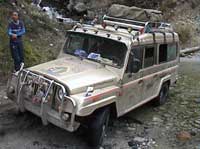
Onedoi took his socks off, rolled up his trousers and waded into the icy stream. He inspected the van then once again retrieved his tool kit. The rear offside wheel came in for most attention, within twenty minutes he had whipped out the drive shaft, and like the front one, it was ruined, it's head had sheared from the shaft. With no drive in the front and now none in the back we were going nowhere. There was only one thing we could do; sit and wait. Wait for the party bastards who were some way behind us. Given the speed of their driving they'd be with us soon. And they owed us for the pull out of the mud. Half an hour later they appeared and picked Onedoi up to take him to the next town. "Don't you think given how good they've been to us we should stop calling them bastards" said Stella. We all agreed, but the moniker was too good to ditch, "the party boys" just didn't have the same ring.
With little else to do than enjoy the immense great outdoors we found ourselves stuck in, and with a surplus of fallen trees and dead wood in our vicinity we did what all good boy scouts would do. We lit a fire. The fuel was damp and smoke bellowed out from our fire. I suggested sending out smoke signals but none of us knew 'SOS' in Chinese smoke.
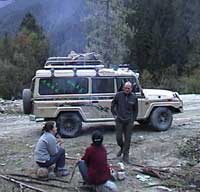 Several hours passed and hunger set in. Trevor got a camping pan out of his pack and filled it with water from the stream. At altitude it takes much longer for water to boil, and our campfire was especially inefficient. The plan was to use it for the pot noodles we'd bought in advance for such an eventuality, but just as we deemed the water to be sufficiently boiled, a single headlamp cut through the early evening darkness. Onedoi rode pillion, got off and handed the owner a large wad of cash. He had a broad grin on his face. And a new drive shaft in his hand. It had taken him an hour to travel five kilometres- the road from here was so bad. Onedoi our hero.
Several hours passed and hunger set in. Trevor got a camping pan out of his pack and filled it with water from the stream. At altitude it takes much longer for water to boil, and our campfire was especially inefficient. The plan was to use it for the pot noodles we'd bought in advance for such an eventuality, but just as we deemed the water to be sufficiently boiled, a single headlamp cut through the early evening darkness. Onedoi rode pillion, got off and handed the owner a large wad of cash. He had a broad grin on his face. And a new drive shaft in his hand. It had taken him an hour to travel five kilometres- the road from here was so bad. Onedoi our hero.
We ate in Lunang. More of the greasy same with rice. Onedoi wandered across the street and bought himself a new pair of white gloves. In anticipation of the forthcoming journey I expect. He knew more than we did. The road was to be closed for heavy dynamiting the following day. We had to cross the 4468 metre pass tonight if we were to get to Bayi and try and make time on our already ruined schedule. It was 11pm. Don't worry said Onedoi, the road to Bayi from here usually takes an hour and a half. That night it took six.
Blizzard at midnight
Leaving Lunang the road disintegrated into a mud bath and with no four wheel drive traction we slipped and made slow progress. "Sod it," said Onedoi in Tibetan. Or something to that effect. he translated it into Mandarin, Stella was far too polite to translate it into English. He then added that he'd just go for it. Suddenly Onedoi was showing true cross-country driving skills. People pay for this kind of experience. We suffered and endured it. We slid round corners as if the jeep were a rally car. Often we'd slide right out to the edge of the road, a precipitous drop hidden in the darkness. The windows began to steam up and we could no longer see out to the sides with wiping them. This was good- Lindsey had had enough and was gripped with fear every time we spun out. Didn't want her to see what we were closely missing. The temperature fell as the altitude rose. Then as we peaked over the pass, with a blizzard blowing outside we ground to a halt again.
Everyone out. We'd be unable to clear the quagmire with all the weight in Onedoi figured, so we clambered out, wrapped up in multiple layers and walked in front of the jeep. This happened several times. We picked up speed as the road crossed a high plateau, the windscreen wipers at full tilt barely cutting through the icy snow that was blanketing the windscreen. And then we stopped again. This time more terminal, the engine was switched off. This time it was a puncture. But we'd been unable to replace either of the two spares so had to make do.
Onedoi sprayed a can of tyre weld into the tyre as we jumped up and down and danced, trying in vain to generate some heat in our bodies. It was cold. Cold for us as Englishmen. Not Canada cold- how the Canadians love to bore with tales of sub zero temperatures, 'man, I broke down in minus forty with only my underpants on', you know, that sort of cold. No it wasn't like that, but it was sufficient to make us irritable and wonder what we were doing in a blizzard on a high plateau in Eastern Tibet, stood in front of a Chinese piece of shit jeep. Onedoi proudly retrieved a battery operated air pump from the back of the jeep. It was still in its wrapper. It was one of those Cheap Chinese novelty goods that are sold in the back of Sunday Newspaper colour supplements. The sort of cheap gift, which appears substantial, that children buy from Argos for their fathers for Christmas. Like the vehicle, it was Chinese made and barely worked. We waited half an hour for the weedy pump to raise the tyre pressure just a few psi. Too much.
For most of the night we didn't get out of second gear, the terrain was that slow and hard going. Third gear would be speeding. At four in the morning we stopped again behind a long queue of lorries. From here to just before Bayi the road was single track. For once, luck was in our favour. The direction of traffic had just been reversed and we waited barely five minutes.
Trespassing on the rooftop of the world
We crawled into Bayi just after five, but it took another hour before we stopped moving. We bundled ourselves and baggage into a hotel and was stopped at the door. "Mayo Lawei." No foreigners. "Wanker" I called the officious Chinese receptionist who gave us the mayo lawei in a south London drawl. Melanie giggled. She knew what I said, but that was the only laughter at that time. We were all tired, cold and thoroughly pissed off.
We'd missed some of the most beautiful scenery on the trip. Missed views of the highest peak in the Eastern Himalayas, Namche Barwa. The scenery when we finally woke up at noon was a dismal room with flies circling the ceiling and a western style toilet that was broken in third across the middle with grimy water in the pan. The flush didn't work. But then nor did any other water in the hotel. I was sick of hotels that had no washing facilities. The Tibetans, who I'd always had affection for were becoming a nation of the unwashed and the Chinese were below contempt. My mood was slightly picked up by Stella who led us to a public bathhouse over the road. She told the proprietor that she was a tour guide from Yunnan. He believed her and we paid local prices, rather than the extortionate Lawei price I'd have paid if I were by my big nosed self. The water was hot and the shower was delightful and briefly washed the hatred of Bayi away.
Bayi is a Chinese town. It trespasses on the rooftop of the world with its bathroom tiles and blue glass and large population of Han Chinese. Bayi means August 1st, the date of the formation of the PLA. It was a depressing place with rows of open fronted shops housing billiards tables and rows of closed fronted shops with prostitutes sitting in the front window looking bored as they knitted woolly socks.
Bayi was less that 500km away from Lhasa, two days drive away. We visited the closest sight, Bachu monastery and were immensely disappointed. Unlike the other monasteries we'd visited, this one was heavily reconstructed after the devastation during the Cultural Revolution. We had to pay to get in, their were signs in Mandarin everywhere for the expected hordes of Han tourists from Lhasa and it would not be long before a tacky gift shop destroys all pretence to the place being anything else than a tourist attraction. Get us the hell out of Bayi we told Onedoi. And he did. Good roads from here on, we overnighted in Kondo Kampa.
Red Velvet and frozen diesel
The hotel room was the best I've ever stayed in. Best for atmosphere that is. It was full of it. The decor was the height of kitsch with red velvet everywhere. It was a 70's porn film directors dream location!
The walls dripped red velvet wallpaper. The beds were soaked in red and the long landing, that in length was straight out of the film The Shining, was floor to ceiling red. Deep dark red dimly lit at regular intervals by low voltage naked light bulbs hung from the red ceiling.
The bathroom was complete with a seventies brown suite, only there were no taps over the bath and the floor was submerged by an inch of water.
Outside the hotel, the town was little more than a single street with much flashing neon, and the din of karaoke coming from the bars and discos. All very cheesy. We ate Chinese. Sorry, we ate grease and rice, in a clean restaurant, but never removed our down jackets and fleeces. Despite the fierce cold outside, patrons entering the establishment didn't close the door behind them. Typical bloody Chinese.
Early start the next morning. This was to be our final day, the assault on Lhasa! It was bitterly cold, when we went out to the jeep Onedoi was already up and out, with his head under the hood, more problems. A pair of cows wandered along the street, munching on the previous evenings litter. Clearly they have no need for street cleaners in Kondo Kampa, leave it to the cows and yaks.
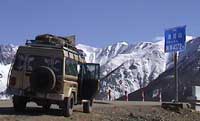 Leaving Kondo Kampa we passed a lorry by the road, its driver was stoking up a bonfire under its engine to warm up the frozen diesel. Passed a herd of yaks, white ice layered their thick shaggy black hair backs. It was so cold. The sort of cold that freezes your toes to the highest levels of discomfort. The heater was fully cranked up, but that meant little in this hunk of crap. Just as a modicum of warmth filled the jeep Melanie would open her window and take a photograph of the passing scenery and all that warmth escaped. I couldn't take photos from my window. It was grimy and frozen shut. We climbed higher and passed nomads by their yak hair tents and herds of yaks. They must be amongst the hardiest people on the earth. It would be a hard existence up here and impossible for a desk bound South Londoner like myself. There was an occasional flat roofed stone building with colourful windows but most of all there was much of nothing.
Leaving Kondo Kampa we passed a lorry by the road, its driver was stoking up a bonfire under its engine to warm up the frozen diesel. Passed a herd of yaks, white ice layered their thick shaggy black hair backs. It was so cold. The sort of cold that freezes your toes to the highest levels of discomfort. The heater was fully cranked up, but that meant little in this hunk of crap. Just as a modicum of warmth filled the jeep Melanie would open her window and take a photograph of the passing scenery and all that warmth escaped. I couldn't take photos from my window. It was grimy and frozen shut. We climbed higher and passed nomads by their yak hair tents and herds of yaks. They must be amongst the hardiest people on the earth. It would be a hard existence up here and impossible for a desk bound South Londoner like myself. There was an occasional flat roofed stone building with colourful windows but most of all there was much of nothing.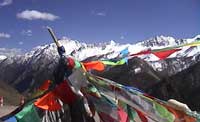
We drove past a group of prostrating pilgrims. These were more organised than the last we had seen, a couple of men towed a handcart with provisions for the pilgrims in front. They must have drawn the short straw, if you are going to go all that way you'd want to be gaining grace and favour for it, as prostration gives.
We stopped by a nomadic encampment to take photographs. The nomads back garden was a breath taking Himalayan mountain range. What looked at first like brown stupas were on closer inspection in fact huge piles of yak dung pats. Dried and ready to be used as fuel. Wood is an unknown luxury in these parts. Four snotty young children who stunk of yak butter gathered around the jeep. Stella handed them apples, the eldest grabbed them all and ran off. "Well he'll be reincarnated as an apple," said Trevor. It was at this point that I mused on the difference between a hill and a mountain. There were jagged snow capped peaks around us, but also rough yellow grassed slopes with a light dusting of icing sugar at their tops. In the UK they'd be classified as mountains I'm sure, but here they were just piddly little hills. I liked Trevor's assessment of the difference. "In my book," he said, "if you can walk up it with your hands in your pockets its a hill. Otherwise its a mountain." He paused, "no," he corrected himself, it's a hill if you can walk up it with your hands in your pockets whistling". "They'll be hills then" I said. We looked at the grassy slopes in front of us and Trevor sagely nodded.
Lhasa ahead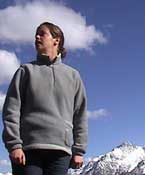
Soon we entered the Lhasa valley. Yaks pulled mould board ploughs and traditional agriculture was in evidence around small Tibetan villages of mud built houses and compounds. As we neared Lhasa, agriculture became more organised. We passed large green houses made with plastic sheets. These were erected by the Chinese army shortly after the occupation and were used for growing vegetables for feeding the occupying army. They tried selling surplus vegetables to the Tibetans but found it hard. The Tibetans, whose traditional diet predominantly consisted of Tsamba and yak butter tea, occasionally supplemented by yak meat, called the Chinese grass eaters. Tibet parents didn't chide their off spring for not eating their greens. The greens were only for the yaks.
The Lhasa suburbs came into view and it appalled me more than anywhere else how the Chinese succeed in building such ugly buildings that are so incongruous and out of harmony with their surroundings. Mountains circle Lhasa, the blue glass and bathroom tile clad buildings jarred with the outstanding natural setting.
And there it was, a building that was in complete harmony with its environment. Onedoi had turned on the stereo and Queens "we are the champions" played and on one level this was appropriate, we were the champions. We had succeeded in crossing some of the world's worst roads. We'd spent a night sleeping in the jeep, a night on the greasy floor of a Chinese road construction cafe. We'd driven well into the early hours on two occasions, suffering bruises on our heads as we were catapulted up over bumps and sore bums when we landed back on them. The jeep was falling apart, the radiator was held in place with wire and the fuel line with gaffa tape. A glove stuffed down a void kept the carburettor in place. We'd had our petrol stolen, lost four-wheel drive, broken two drive shafts and suffered daily punctures. The biggest injustice was what we'd paid for all this. Mr Chen and his crony Oscar had charged the five of us more than $600 each for the privilege. What a rip off! The local drivers they employ to get tourists to ply this route get paid little more than $100 a day. The itinerary we'd been given was impossible to follow given the state of the roads. But worse still, it looked nothing like the itinerary they'd given our driver to follow. Still, we'd made it. It had been at times a fearful experience, but we'd been lucky in that as a group of people we grew close and became good friends. Stella's ability to talk Mandarin went a long way in endearing us to our skilful driver, Onedoi. If it hadn't been for her I'm sure we'd have distrusted him as a crook, keen only to get to Lhasa as soon as possible and not have believed his stories about roadblocks and avalanches until it was too late. And now, as Lhasa neared, the trip was coming to an end.
And there it was, seeming to cling to the side of a mountain (it in fact sits on a hill by itself) was the now vacant seat of the Dalai Lama, the Potala Palace. It was a magical moment, that first glimpse. A lump formed in my throat, as for me, I was seeing, in the flesh, one of the awesome wonders of the world. It did not fail to impress me like the Taj Mahal and the Terra Cotta army had.
We drove into Lhasa itself and I felt sad. It was like any other Chinese city. The Chinese have well and truly stamped their mark here. We drove around looking for a bank but all gave the same answer, "no worker". We had to go to the main branch for 3pm. As we waited for a worker outside the main branch a Han Chinese man approached us and rolled out a snow leopard skin from his bag. They've plundered the culture, the natural surroundings, and clearly the wildlife too I thought.
We stood in line at the bank, waiting to change our traveller's cheques. It was an otherworldly experience after the squalor and grime we'd been through over the past ten days. Polished granite and marble and air conditioning and western-style business cleanliness seemed totally out of place. Two monks strolled up to the counter next to ours and we were brought back to Tibetan reality. The stench of the unwashed and yak butter wafted under our noses as they passed.
We found a decent hotel in the old, Tibetan quarter. This is an untruth, as it is a sad fact that the Tibetan quarter is little more than 4% of Lhasa now. More like the Tibetan Twenty fifth.
Tibetan Marc
At university, one of the first assignments we'd been given was to research a subject- any subject of our choice, and give a ten-minute presentation on it. It was to give us experience of orally presenting our work to our peers. I chose to talk about Tibet, seeing how I'd recently been to Dharamsala and met the Dalai Lama and begun to learn about the injustices and cultural genocide that the Chinese were committing. So I talked about the atrocities with passion and called for a free Tibet. And as in the early days at university I had little to do with my peers I attended lectures with, I was elusive and an enigma and was labelled with the nickname 'Tibetan Marc'.
Tibetan Marc was now in Tibet and sought evidence of those injustices he had so passionately spoken about. I could already see the aesthetic damage that the Chinese had wrought on Tibet, and knew about their historical brutality, remembering that the Cultural revolution destroyed much of mainland China, as well as Tibet. Before the Chinese invasion in 1951, Tibet was little more than a backward, under-developed theocracy, with serfdom and poverty rife. The monasteries held a grip on the country. Indeed the population shrank over the centuries, with families gaining favour by sending their sons off to be celibate monks. On the spiritual plain, Tibet was booming, but for most of the population it was a tough existence. A scene from a Monty Python film kept recurring in my mind. The characters are sitting in an amphitheatre and the question is asked "what did the Romans ever do for us?" The answer comes along the lines of "well brother, they gave us roads..." "And sanitation..." "Well alright then. Other than roads and sanitation, what did the Romans ever do for us?" And I think of Tibet and Tibetans and 'what did the Chinese ever do for Tibet". And a Han Chinese man would point to the roads, and to the sanitation, and to the influx of cash and consumer goods. And he'd be right. I spoke to one Tibetan who lamented his fellow countrymen, going someway to praise the Chinese. "The problem with Tibetans" he said, "is they are only interested in living and dying. The stuff in-between is not important. Like making money. They are just not interested in it." And that is the problem with the world today I fear. The capitalist world and the mighty dollar are the new God. And when you worship dollar you no longer need the freedom of speech or the freedom of worship because they are irrelevant in the eyes of your new God. The only right is the right to make money. And with the influx of Han Chinese, and more so Han capitalism with its dearth of morality, Tibetan culture, however strong it is today, will slowly be eroded. Tibetans will become like the Chinese, with no qualms about hungrily pursuing the dollar. Like the Chinese, personal morality will be eroded. With the news that the person behind the mass poisoning in China (a snack bar owner lacing the food of his rival with rat poison, killing forty two people) had been sentenced to death, the China Daily News reported a lawyer commenting on the case. "He did all this only out of revenge and had no idea he was breaking the law at all... Some people do not even know what is legal and illegal" the lawyer was quoted as saying. And that, I feel sums up the Chinese in Tibet. They have no idea.
